#it’s not even Sir Walter Scott’s best book
Text
now that I’ve got you all more or less used to early modern Scots via Kidnapped Weekly, is there any chance I can make anyone read Redgauntlet?
#it’s got folk music#(it’s got folk music used AS A SECRET CODE which is my favorite thing ever)#it’s got intense youthful friendship#it’s got a slightly disturbing love triangle#it’s got mysterious family secrets#it’s got an epistolary framing#it’s got an entirely unhistorical third Jacobite rising#it’s got Scots law#it’s got everything#it’s not even Sir Walter Scott’s best book#but it has everything I like#recommended for fans of gothicness and Scots law#(and folk music used as a secret code)#I’m not doing a substack though y’all have to just read it yourselves
5 notes
·
View notes
Text
Random Interlude
My father, while we were talking about Shannara and Wishsong of Shannara and Slanter the gnome and pragmatic cowards with a badly hidden honourable streak, reminded me of another rank cad and shirker and dishonourable coward, with not so much of a honourable streak: Colonel Thomas Blood, from George MacDonald Fraser’s ‘The Pyrates’ (yes, based -if loosely- on the historical Colonel Thomas Blood, the one who tried to steal the crown jewels, had a chat with the king, and got off scott free from it). The Pyrates is one of the original golden age of piracy spoofs, written in the 1980s, and primarily follows Captain Benjamin Avery of the King’s Navy, a fully over the top parody of a classic swashbuckling hero, who gets embroiled in the theft and search for a jewelled crown that’s been taken and split into six parts by a cadre of pirate captains (who, again, are ‘loosely’ based on RL golden age pirates). But also embroiled in said mess, as a counterpoint, is our own Irish Colonel Thomas Blood, who is, to put it mildly, a card-carrying scoundrel.
Now, this was from the 80s, and a parody, so the treatment of various topics and the behaviour of some of the characters is a bit … yeah. But. I do enjoy it for what it is, and I’ll always remember one particular Blood and Avery moment, very early in the book. Blood has gotten in a fight with Avery, thinking the dashing blond idiot will be easy to knock off, and then he can snaffle the crown for himself. But he gets injured during the fight, which will ID him if anyone goes looking for whoever knocked off Avery on deck during the night, so he has to recalculate and make Avery believe it on the fly. So he decides to abruptly, mid-fight, to disarm the man with a dirty trick and then pretend to be another Admiralty agent sent to shadow and test Avery, and we get this gem:
---
“All right, all right!” Blood interrupted warmly. “Can you think of a better cover?” he asked knowingly.
“You mean,” whispered Avery incredulously, “that you’re not really a notorious foul villain of ill repute—”
“Rank repute.”
“— Rank repute and noisome infamy, steeped i’—”
“If I was, you wouldn’t be standing here running off at the mouth, remember?” snapped Blood. “Some of us,” he went on virtuously, “don’t mind being given a bad name if it enables us to serve his majesty better. We don’t insist on going poncing about like Sir Walter Raleigh. We are content to wear,” he added bitterly, “dishonour’s mask in honour’s cause.” Here, that’s not bad, he thought; a nifty to remember.
---
I just love that abrupt mid-combat switch, where the murder failed, so it’s time for a quick change-of-pace con to get him back out of the hole again. And Avery, being a very logical and virtuous hero-type, and also familiar with the British Admiralty and their tendency to just do things and not tell the Joe Soaps on the ground about it, buys this hook line and sinker. And is all anguished that he failed the test, and is found wanting, and not only doubted but wounded this ‘honest, sturdy gentleman’. They head back below decks arm in arm, and as they part:
---
There they bade each other a comradely good-night, and sought their respective cabins, Avery thinking, what a worthy fellow, and Blood thinking, what an amazing birk.
---
It is a fun book, and Blood is easily the best part of it. ‘Here, that’s not bad, he thought; a nifty to remember.’ It’s a great line, dishonour’s mask in honour’s cause, and he’s just making it up off the cuff based on what he thinks this idiot will swallow.
You’ve got to love a quick-thinking swindler, even when he’s got no particular morals to speak of. Just for the craft. Heh.
#quotes#the pyrates#george macdonald fraser#colonel thomas blood#conman and swindler extraordinaire#and decent sword fighter when pushed
4 notes
·
View notes
Photo
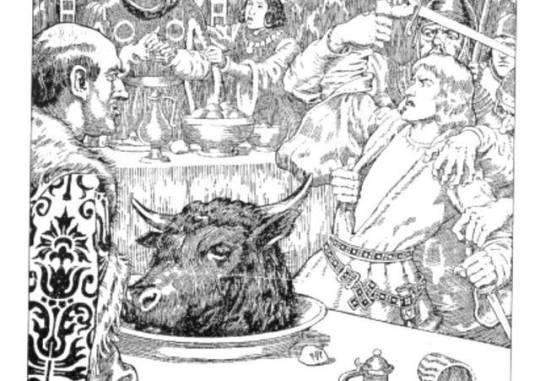

On 24th November 1440 what became known as The Black Dinner happened in Edinburgh Castle.
James II became king in 1437 after the murder of his father. His minority years saw a great deal of bloodshed as rival factions attempted to control Scotland through the young king. His reign would be characterised by his struggles to break the power of a leading clan and assert his own control over Scotland.
The Clan Douglas represented a strong presence on the council led by the 5th Earl of Douglas, Archibald Douglas, who served as regent to the young King James II. On 26th of June 1439, Archibald Douglas died of a fever, thus passing the title of Earl of Douglas to his young 16-year-old son William.
Despite their young ages, Sir William Crichton and his ally Sir Alexander Livingston, who managed Edinburgh Castle and Stirling Castle respectively, viewed the youngster as a threat to the crown and their influence over it.
As a result, they invited rivals from the Clan Douglas, namely 16-year-old William serving as 6th Earl of Douglas and his younger brother David to Edinburgh Castle for a feast with the now 10-year-old King James II.
During middle of the meal, a servant brought a mysterious dish and placed it on the table. It was the severed head of a black bull, which served as a signal regarding imminent demise of the Douglas boys. Despite pleas from the king to stop, the Douglas boys were taken outside to the castle yard, subjected to a mock trial, found guilty of treason and beheaded.
The events of this night would forever become known as the Black Dinner.
Scottish poet and novelist Sir Walter Scott would write centuries later:Edinburgh;
Castle, toune and towre,
God grant thou sink for sin!
And that e’en for the black dinner
Earl Douglas gat therein.
Despite the murders, the Douglases came to dominate the Scottish court, filling the major offices and posts of government with their family and supporters. When James finally assumed the role of governing Scotland by himself in 1449 he found that the Douglas clan had a stranglehold on power that they would not give up lightly.
James spent much of his reign attempting to break the Douglases. Typically for his reign, this involved murder in an evening that would echo the Black Dinner some nine years earlier.
Game of Thrones author George R.R. Martin used this dinner as inspiration for his bloody and shocking Red Wedding in his best selling Storm of Swords book and in the popular TV series. "No matter how much I make up, there´s stuff in history that´s just as bad, or worse," Martin said.
22 notes
·
View notes
Text
Mid Year Book Freak Out 2023
Thanks for tagging me @dauen! I was worried I wouldn't have enough answers this year as I've been more eclectic than usual with my reading, but I do 😅 And apologies for the frequent mention of le Guin, 2023 is the year of Ursula K. le Guin for me!
1. Best book you've read so far...
The Red and the Black by Stendhal
I was surprised when I was swept away by the second half of this book, it not only made me love the second volume but gave me a new appreciation of what Stendhal did in the first volume. I'm still thinking about The Red and the Black months later and it's a strong contender for my favourite book of the year.
However, there were two book I could have mentioned that were new reads for me, but I've gone with this as the other is...
2. Best sequel you've read so far...
The Tombs of Atuan by Ursula K. Le Guin
This did something to my brain, as much as I'm thinking about The Red and the Black, I'm obsessed with The Tombs of Atuan. The atmosphere, le Guin's writing, and Tenar came together to create an almost perfect (for me) story.
3. New release...
Tress of the Emerald Sea by Brandon Sanderson
By default... I've only read Tress so far - I didn't even particularly enjoy Tress 😬
4. Most anticipated release of the second half of the year...
Errm none? I've got no idea what's going on with new releases because I'm trying to clear my blacklist and physical tbr.
5.a. Biggest disappointment...
The Leviathan by Rosie Andrews or Howl's Moving Castle by Diana Wynne Jones
I've separated biggest disappointment and most hated this year because they really do belong in different categories (see 5.b). Both of these would've been great for someone else... I shouldn't have read The Leviathan as a specialist in 17th century, it ended up annoying me with it's blend of history and story. Howl's Moving Castle just isn't my cup of tea, it was a bit too whimsical and it rubbed me up the wrong way.
5.b. Most hated...
Witches: James I and the English Witch-Hunts by Tracy Borman
I've made no secret of how this one pissed me off with it's bad faith portrayal of James I and the witch-hunts in England. I was left seething when reading it, so it deserved it's own spot in a created category.
6. Biggest surprise...
The Poetry of Christina Rossetti
I'm typically not a poetry girl, and when I have read it I've tended to prefer epic and narrative poetry. So when I picked up a collection of Rossetti's poetry I expected to find it tedious... However, I loved exploring her poetry! I now how copies of my favourites in my commonplace book and she's inspired me to try more poetry in the future.
7. Favourite new author (debut or new to you)...
Ursula K. Le Guin
Without a doubt she is a new favourite. I've read so many essays and short stories, watched pretty much every speech she gave that I can, and, of course, been in awe as I've read through the first half of Earthsea.
8. Newest fictional crush/favourite character...
Ged from the Earthsea Cycle
I've spent far too long trying to think of a non-le Guin new favourite character... But it's definitely Ged.
9. A book that made you cry...
None!
10. A book that made you happy...
Emma by Jane Austen
Emma always makes me happy and it's the happiest I've been so far this year.
11. Favourite adaptation...
I haven't watched anything new 😅 I rewatched House of the Dragon which was better the second time around, and Emma 2020 is always a favourite - but I don't think they count.
12. Prettiest cover...
Ivanhoe by Sir Walter Scott
I haven't really bought that many pretty books as I've mainly shopped second hand this year... So, it's probably this vintage copy of Ivanhoe, but we have room for improvement!
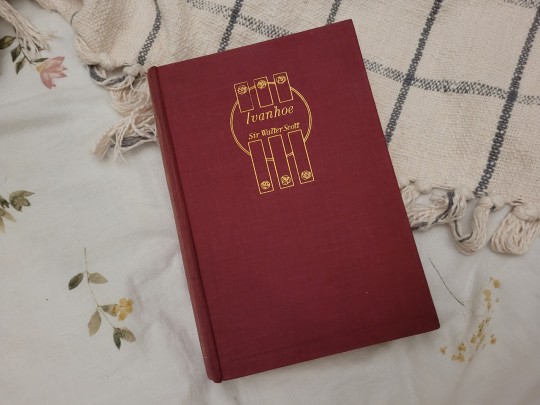
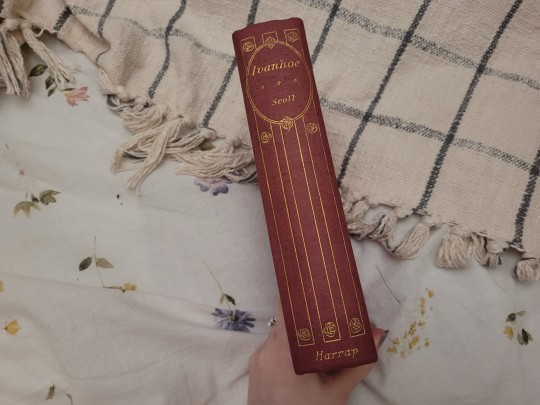
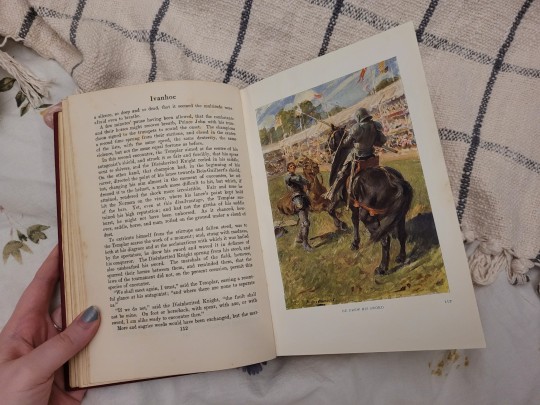
13. A book/books you need before the end of the year...
Oh I have a stack, but some off the top of my head:
A Brightness Long Ago by Guy Gavriel Kay
Fugitive Prince by Janny Wurts
The Charterhouse of Parma by Stendhal (technically I started this, but I got distracted by other French novels... Oops)
Lady Audley's Secret by Mary Elizabeth Bradden
Silas Marner by George Eliot
Tagging: @oneanxiousstudybuddy and @dooareyastudy (I think you haven't been tagged yet but could have missed it, sorry if you have 😅)
#mid year book tag#mid year book freak out tag#books#reading#bookblr#books of 2023#ursula k. le guin#sir walter scott#ivanhoe#I feel like I'm living under a rock this year#I should read some new releases and watch TV!#I won't do either but I recognise that I probably should
4 notes
·
View notes
Text
Joseph: God Intended It for Good
Today's inspiration comes from:
The Defining Verse
by Warren W. Wiersbe
Genesis 50:20
"'Although Joseph spent most of his life in Egypt, he represents Jewish manhood at its best . He had clean hands and a pure heart, yet he suffered considerably because of what others did to him. His father pampered him and his older brothers hated him and sold him as a slave. His master’s wife lied about him, and he was imprisoned and forgotten by everybody except God.
They bruised his feet with shackles, his neck was put in irons, wrote the psalmist. — Psalm 105:18
The Anglican Prayer Book version of 1877 reads, “The iron entered into his soul .” I have a feeling that Joseph experienced both kinds of suffering. What a man!
It has well been said that what life does to us depends on what life finds in us, and this truth is no better demonstrated than in the history of Joseph. Here we will focus primarily on Joseph, but to appreciate his response to what God permitted him to experience, we must take time to examine the responses of his father and his ten brothers.
THE BROTHERS: “WHAT IS GOD DOING TO US?”
Their actual response was, “What is this that God has done to us?” (Genesis 42:28), and they said it when one of them found his money for grain returned in his full grain sack. What a shock! Each man’s conscience was smiting him, and each man was afraid of what the Lord was going to do. Had they thought about the justice of the Lord when they sold Joseph, they never would have sinned as they did, but they were sure they could get away with it.
When they arrived home, they all found their money in their sacks; and then they had to tell their father that Simeon was being held hostage in Egypt. But the news got worse: the Egyptian lord would release Simeon only if they brought Benjamin along on their next trip. Joseph had learned from his dreams that all eleven brothers had to bow before him (Genesis 37:5-11), so he kept Simeon and demanded to see Benjamin.
The brothers’ evil conduct was catching up with them. They had hated Joseph and couldn’t speak to him without showing their hostility. Jacob, Joseph, and Benjamin had each other, but the ten older brothers made life miserable for Joseph. According to Genesis 50:15, they wronged him, treated him badly (Genesis 50:17), and intended to harm him (Genesis 50:20) . In spite of his tears and entreaties, they threw him into a pit, plotted to kill him, and then sold him — their own brother! — as a slave (Genesis 42:21-22).
In being cruel to Joseph they were also cruel to Jacob. They lied to him and told him that Joseph was dead, and they even manufactured “evidence” to convince their father they were telling the truth. Sir Walter Scott was right — “O what a tangled web we weave when first we practice to deceive.” Jacob didn’t see his beloved son Joseph for more than twenty years, and he grieved for his son, thinking he was dead. How wicked for those brothers to lay this fictitious burden of sorrow on their father in his old age! Yes, Jacob was being paid back for lying to his own father, but that doesn’t excuse the brothers for their lies and cruelty.
What was God doing? He was bringing them to the place of truth, repentance, confession, and forgiveness. God was using Joseph to deal with them in a wise and patient way.
JACOB — “GOD IS DOING NOTHING!”
Jacob didn’t say that God was doing nothing, but that’s the way he felt in his heart. What he said was,
Everything is against me! — Genesis 42:36,
and it certainly looked that way.
Consider his trials. There was a famine in the land, and his sons had to travel to Egypt for food to sustain the large family. Jacob thought his beloved son Joseph was dead, and now his son Simeon was being held hostage in Egypt. Even worse, the ruler of Egypt said he wouldn’t release Simeon until the brothers brought Benjamin with them on their next trip. Both Benjamin and Joseph were the only sons of Rachel, Jacob’s favorite wife, now deceased, and Jacob couldn’t bear losing both of them. No matter where he turned, Jacob faced painful problems and had to make difficult decisions. Where was the Lord?
Jacob was forgetting the promise God made to him long ago at Bethel.
I am with you and will watch over you wherever you go, and I will bring you back to this land. I will not leave you until I have done what I have promised you. — Genesis 28:15
When Jacob fled from Laban, God said to him,
Go back to the land of your fathers and to your relatives, and I will be with you. — Genesis 31:3
“I will not leave you” — that’s the negative. “I will be with you” — that’s the positive. And the night that he wrestled with the Lord, Jacob’s name was changed from Jacob to Israel. He had struggled with God and was now an overcomer, a prince with God. Surely his ever-present limp would remind him of this.
If God is for us, who can be against us? — Romans 8:31
Let’s not be too hard on Jacob; after all, where would he get spiritual help in his family? Furthermore, you and I already know how the story ends, and that makes it easier for us to smile and quote Romans 8:28. “Jacob, don’t say that everything is working against you! God says it is all working for your good.” But Jacob didn’t know Romans 8:28, and he was a man with a broken heart. The next time our own world is shattered and we wonder if God really cares, maybe we’ll better understand how he felt.
How could Joseph hate his brothers when he knew that God intended everything to produce good?
JOSEPH — “WHAT GOD DID HE INTENDED FOR GOOD”
At least five times in Scripture we are told that “the Lord was with Joseph” (Genesis 39:2, Genesis 39:3, Genesis 39:21, Genesis 39:23, Acts 7:9), which means that God was in control of events so that everything would work out for the good of Joseph and his family and for the glory of God. It’s important to note that God worked everything together for good throughout the entire experience and not just at the end. Romans 8:28 doesn’t say, “And we know that God will work out everything for good in the end,” but that He is always at all times working things out for good, no matter how we feel or what we see.
The most important “good thing” that God was accomplishing was the preservation of the nation of Israel (Genesis 50:20), because through them, God would give the world the Word of God and the Son of God. Joseph was God’s chosen servant to shelter Israel and to save a lost world. God “sent a man before them” (Psalm 105:17).
What happened was good for Jacob and his sons. Surely Jacob realized that he was reaping the bitter fruit from some of the seeds of deception he had sown years before, and the brothers were finally brought to the place where their mouths were stopped and they had run out of lies and excuses. “What can we say to my lord?” said Judah . “What can we say?” (Genesis 44:16). Every mouth was silenced as the men (Benjamin excepted) stood guilty before the Lord and Joseph (Romans 3:19). It took twenty-two years for the brothers’ sins to find them out, and then Joseph forgave them and assured them of his love. A few years before, when Joseph’s first son was born, Joseph named him Manasseh — “forget” — which means Joseph was not holding any grudges or looking for ways to avenge himself . F . W . Robertson said, “The only revenge which is essentially Christian is that of retaliating by forgiveness.”
How could Joseph hate his brothers when he knew that God intended everything to produce good?
Perhaps Joseph himself was the recipient of more good than anybody else. Psalm 105:17 says that God sent “a man” before them, but Joseph was only a somewhat pampered seventeen-year-old boy when his brothers sold him. God gave him two dreams to sustain him, but dreams without disciplines become nightmares; so the Lord sent one discipline after another to form him and polish him.
Joseph knew the pain of family rejection, the humiliation of being sold as a slave, and the sorrow of separation from loved ones at home. He endured the demands of hard work in a foreign land, the temptations of the world, the helplessness of condemnation by false accusation, the misery and shame of imprisonment, and the seeming absurdity of the whole thing. But these experiences were used by God to turn a boy into a man and a servant into a rule. He was faithful over a few things, so God entrusted him with many things (Matthew 25:21).
I have counted seven times in this narrative when Joseph wept. He wept and pleaded when he was thrown into the pit (Genesis 42:21-22) . He wept when his brothers admitted their sins to each other (Genesis 42:24) and when he saw his brother Benjamin (Genesis 43:30) . He wept loudly when he was reconciled to his brothers (Genesis 45:2, Genesis 45:14-15) and “for a long time” when he saw his father after more than twenty years (Genesis 46:29). As any son would do, he wept when his father died (Genesis 50:1). When he read his brothers’ message asking for forgiveness, he wept and assured them that they were forgiven. They wanted to become slaves, but he assured them they were sons. Does that sound familiar? (See Luke 15:19, Luke 15:21.)
The disciplines of Joseph’s life, plus his faith in the Lord, transformed him into one of the most beloved characters in the Bible, a man who is very much like Jesus Christ. Like Jesus, Joseph was beloved by his father but hated by his brethren. He was illegally sold, he was falsely accused, and he was condemned and imprisoned. Joseph went from the prison to the throne, from suffering to glory, and he provided bread for the known world. (Joseph merely sustained life; Jesus gives life.) Joseph also gave forgiveness to his brethren and provided a home for them. There is much more, but I’m sure you get the point: it is only as we suffer for and with Jesus that we become more like Him. On the other side of Romans 8:28 is Romans 8:29, which says that God’s purpose is that we “be conformed to the likeness of His Son.”
In the midst of pain and trouble, it takes faith for us to say, “God intends this for good,” but that’s just what we must do. To say that “everything is against me” when everything is working for me, is to rebel against the loving heart of God. To ask, “What is God doing?” when we know His purpose is to make us more like Jesus, is to make our situation worse.
In the midst of danger and difficulty, David wrote,
But I trust in your unfailing love; my heart rejoices in your salvation. I will sing to the Lord, for He has been good to me. — Psalm 13:5-6
“God intended it for good,” says Joseph . We reply, “God is good — all the time!”'
Excerpted with permission from The Defining Verse by Warren W. Wiersbe, copyright Warren W. Wiersbe.
0 notes
Text
Fateful Words: A Scottish Bookshop Mystery by Paige Shelton #Review / #Giveaway @MinotaurBooks @AuthorPaige
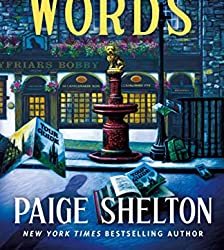
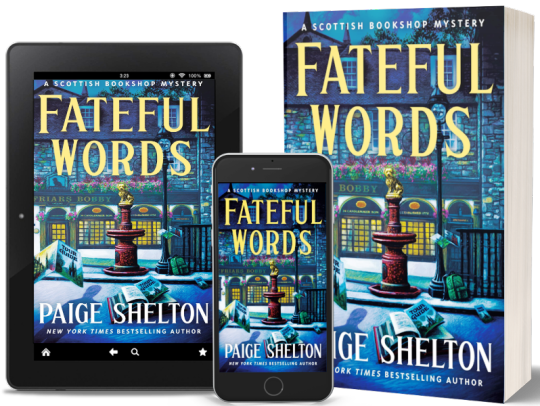
Fateful Words: A Scottish Bookshop Mystery
Cozy Mystery
8th in Series
Setting - Scotland
Minotaur Books (April 4, 2023)
Hardcover : 304 pages
ISBN-10 : 1250789532
ISBN-13 : 978-1250789532
Kindle ASIN : B09Y45JKX5

In Fateful Words, the eighth Scottish Bookshop Mystery from beloved author Paige Shelton, bookseller Delaney Nichols stakes her reputation—and her life—when a literary tour turns deadly...
When Edwin, Delaney’s boss at the Cracked Spine bookstore, leaves town on secret business, Delaney is called upon to guide his yearly literary tour around Edinburgh. But on the first night of the tour, at the inn where the tour group is staying, the inn manager falls—or is pushed—off the roof of the inn, and killed. Then, one of the tour members disappears, leaving a trail of puzzles in her wake.
In a race against the clock, Delaney sets out on the expedition of her life, following clues around Edinburgh to get to the bottom of this mystery. Exploring sights from Greyfriars Bobby to the Royal Mile to the Sir Walter Scott Monument, she'll have to put the pieces together quickly, or the bookstore's survival could be on the line...as well as her own.
Dollycas's Thoughts
Delaney Nichols loves her job at The Cracked Spine Bookshop. Working on the "dark side" of the shop organizing owner Edwin MacAlister's many collections is like a dream come true.
Right now Edwin is off on some secret business and took Hamlet with him. Normally that wouldn't be a problem, Rosie and Delaney can handle the bookstore, but this is the week of Edwin's yearly literary tour around Edinburgh and his invited guests have already arrived. Delaney has no choice but to take over the tour knowing the participants are going to be upset. Edwin's tours are legendary and while Delaney can't measure up to his fame but she will give it her all to give them the best time in Edinburgh she can.
The first day of the tour went pretty well but after dinner trouble breaks out at the inn where the group is staying. The manager has fallen or was pushed off the roof, an employee has been attacked and one of the members of the group has disappeared.
Delaney has another real-life mystery on her hands and she and her husband Tom team up to do their best to solve it. They soon realize both Delaney's life and the bookstore are in danger so time is most definitely of the essence.
Fateful Words is the 8th book in Scottish Bookshop Mystery Series and this is my new favorite.
Delaney Nichols has grown so much since she arrived in Edinburgh, a farm girl from Kansas. She is confident in her job, married a wonderful man, and has made many friends. This time she was put to the test and had to fill in for Edwin and for a newcomer she did an excellent job. I love the way she follows the clues and always shares her findings and theories with Inspector Winters although I am sure it gets to be a bit much for him at times.
I really enjoyed that even though he was away in London Edwin played a major role in this story. He is a fantastic boss and truly Delaney, Hamlet, Rosie, and even Hector are his family. They have a strong bond and that is what makes this series so strong. The characters are realistic and genuine and it is very easy to get invested in their lives.
Ms. Shelton takes her readers right along as Delaney escorts Edwin's guests on a tour of the city. Her descriptions paint pictures whether it be above ground or below. I felt like I was on a fabulous virtual vacation to a city I would love to travel to someday. The fact that she intertwines a couple of fantastic mysteries along the way makes it even better yet.
Those mysteries have a bunch of moving parts made harder to solve by a variety of twists and turns. I was fascinated by the notion that instead of narrowing down the number of suspects the list increased as the story played out. Another change from previous stories Delaney's "book voices" were silent throughout most of the story. The twists mounted as we got closer to the end and the suspense takes a big jump. The pages were flying and I was holding my breath. Wow, what an ending.
Surely one of the best books I will read this year. Fateful Words is a supreme addition to this series. A complicated mystery, with delightful characters, set in a dream locale. I was entertained from the moment I opened the book until the final page. I really have a hard time letting these characters go. Until next year Edinburgh, my virtual bags are already packed.

About The Author
Paige Shelton is the New York Times Bestselling author of the Farmers’ Market Mysteries and the Country Cooking School Mysteries. She’s lived in lots of places but currently resides in Arizona. Find out more at www.paigeshelton.com




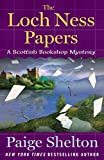

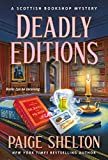



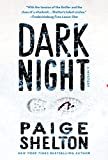

Coming December 5, 2023
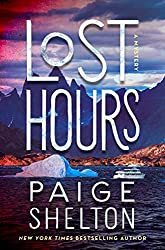







Read the full article
0 notes
Text
@gideonseymours and i decided that our harrow the ninth literary commentary was looking a little lonely, so, here you go, a complete (to the best of our knowledge and ability) literary commentary for gideon the ninth. as in the harrow commentary, we’ve done our best to compile and source all the quotes and references and left you on your own for the memes. please let us know if there’s anything we’ve missed!
this does include mild spoilers for harrow the ninth; be warned.
p. 40: “…with trump and timbrel.” though the words sound biblical, the main places where this specific phrasing comes up are in “rebecca’s hymn,” an original poem from sir walter scott’s novel ivanhoe (1819), and in the hymn “king jesus hath a garden,” translated from dutch by george woodward.
p. 131: “Fiat lux!” in english, “let there be light!”, from the third verse of the book of genesis in the latin vulgate edition. palamedes is using it a little sarcastically, as camilla catches on to what he’s saying about the weirdness of the different ages of things in canaan house. on the next page, they have a fun exchange where camilla says “swords don’t lie,” to which palamedes responds “no. but they don’t tell the truth either,” which, while not a reference, is a fun piece of foreshadowing, if you’re into that sort of thing.
p. 131 “impossible, warden.”...”improbable, warden.” recalls the classic sherlock holmes-ism “when you have eliminated all which is impossible, then whatever remains, however improbable, must be the truth” (from the case-book of sherlock holmes, 1927). camilla’s other exclamations in this scene also have a definite watsonian vibe. they’re such nerds and i’m obsessed with them.
p. 138: It is finished! this showed up in the harrow commentary, too. it’s the most common translation of τετέλεσται, jesus’ last word(s) before dying on the cross in john 19:30.
p. 173: “Light is the paper-killer.” could be a cute joke on “fear is the mind-killer” from frank herbert’s dune. certainly on the line between meme and serious reference but i guess if gideon is getting frontline titties of the fifth[1] on pluto, palamedes might have read dune.
p. 241: “The die is cast.” this is the english translation of “iacta alea est,” julius caesar’s famous declaration when he led an army across the rubicon river to kick off a civil war. it’s an appropriate quote for the necromancer of the second, but whether it’s a deliberate reference or an idiomatic use is unclear.
p. 311: “Let the dead reclaim the dead.” a paraphrase of the phrase “let the dead bury their dead” from mumford and sons’ “thistle & weeds” luke 9:60.
p. 367: It is finished! see note on p.138.
p.378: “you are an intellectual cretin and a dog in a manger…” the ancient greek fable of the dog in the manger describes a person who neither uses nor allows other people to use a particular resource. it falls into the middle ground between idiom and reference, but it is an obscure enough pull that, whether or not palamedes was intentionally quoting aesop, we found it helpful to gloss.
p. 398: Palamedes surveyed his work, and he saw that it was good. the second half of this line is a recurring quote in the creation story in genesis 1. the entire line is found at genesis 1:31. this is, as far as we can find, the only biblical reference given in the narration rather than in dialogue.
p. 438: “The land that shall receive thee dying, in the same will I die: and there will I be buried. The Lord do so and so to me, and add more also, if aught but death part me and thee.” the longest and most obvious bible quote in the book: ruth 1.17, douay-rheims translation. commonly used in wedding vows and repeated by harrow on page 380 of harrow the ninth.
[1] nav, you ass, that’s not even a real publication
126 notes
·
View notes
Text

Okay, let’s talk about Maid Marian. Let’s really talk about Marian. So often I see her character disparaged as a damsel in distress without agency of her own, but that is honestly so far from the truth. In fact, Maid Marian is considered to be one of the earliest examples of the “strong, independent woman” character archetype. Not only is it untrue to call her a damsel in distress, it’s also unfair.
As with many stories, Robin Hood is a story filled with men. I love it, but there’s no denying it’s a story filled with men. As the only prominent female character in a story that has been retold for close to 1000 years, centuries of ideas about femininity have been funneled into this singular character. Among the array of male characters, we see many ways to be masculine: smart, witty, artistic, strong, brave, charitable, loyal, both fighters and lovers. All of the characters have been adapted through the years, but Marian can still be distinguished as the only canonically present female character in the main cast.
Other women we traditionally see include Alan’s bride, the Prioress of Kirklees Abbey who murders Robin, Marian’s serving woman, and a few queens. Various contemporary novels, films, and TV representations have added women to the cast to even it out, but Marian is still the only primary female cast member. As such, centuries of what it can mean to be a woman have been reflected through her.

Let’s take a look at what exactly that has looked like through the years.
One of the things I love best about Robin Hood as a legend is that it is constantly evolving and changing for the needs of the audience. Across centuries and decades it has been changed to suit the ideas of the day. Even the oldest extant documentation of Robin Hood is not considered the “original version” because there is no way of really knowing when or how these stories started, or how long it took for them to be written down.
So, just as there isn’t a standardized Robin Hood, there isn’t a standardized Maid Marian. We know that she was added later in the Robin Hood tradition, during the 15th century as part of May Day celebrations, and quickly became a common character in future iterations of the Robin Hood story. Her origins are still murky at best, and it’s impossible to pinpoint the very first time she was introduced.
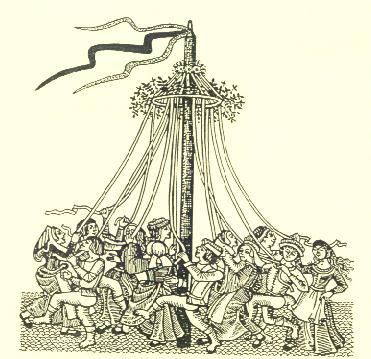
Her many origins include a shepherdess named Clorinda from Child Ballad 149, an unrelated Marian character in 15th century May Day games who happens to also have a lover named Robin, and a historically based woman named Matilda Fitzwalter appears in Anthony Munday’s “Huntingdon” plays from the 15th century. Furthest from our understanding of Marian is a play titled Robin Hood and the Friar, very merry and full of pastime, proper to be played in May Games. In this play we find Marian as a “trull” a.k.a. prostitute, employed by Friar Tuck. A far cry from how we know both Marian and Friar Tuck today. So far, she’s a working woman, a noblewoman, a romantic interest, and a prostitute.
The best known and most enduring of these early variations is Child Ballad 150 (you can read it in full here). In this ballad, we see Marian dress as a boy, and go into the forest fully armed, to seek out her lover, Robin Hood. When she finds him and does not recognize him, they begin to fight and Marian handily beats him in their sword fight. Robin immediately asks her to join the Merry Men, they recognize each other, and return to camp for feasting and a “happily ever after” full of adventures.
undefined
youtube
- Child Ballad 150
“With quiver and bow, sword, buckler and all,
Thus armed was Marian most bold.”
This ballad is reminiscent of introductory stories of the Merry Men -- Robin meets a stranger, they fight, the stranger wins, and Robin offers them a place in his band.
We can clearly see in Child Ballad 150 that Marian was considered Robin’s equal and a regular member of the group from early on her individual tradition. Other parts of her early tradition survive as well -- she’s a romantic partner for Robin, and a noblewoman.
As we progress forward in Robin Hood traditions, we continue to see the story change. Notable changes occur during the Victorian period, when general interest in Robin Hood stories was revived thanks to the publication of Sir Walter Scott’s Ivanhoe (1819) and Howard Pyle’s The Merry Adventures of Robin Hood (1883). Marian does not appear in Ivanhoe and is mentioned only once in Pyle’s book, and is effectively written out of the story entirely.
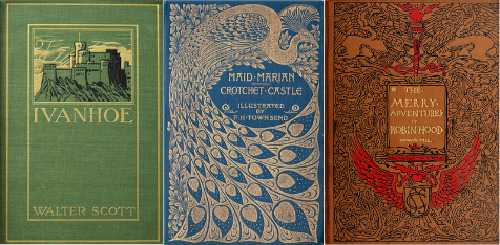
Despite this, we see other novels and stories released as Robin Hood grows in popularity, and here is where we begin to see the idea of a damsel in distress begin to gain traction. As is true in every retelling of Robin Hood, the story changed to suit its audience and to suit the ideas of contemporary society and intended audience.
Victorian literature is full of interesting and lesser known works of Robin Hood, as a result of a Victorian obsession with medievalism and with Robin Hood. Maid Marian and Robin Hood: A Romance of Old Sherwood (1892) by J.E. Muddock features a very distressed Marian who does need rescued and has very little agency. Other Victorian works take a similar tone and cast Marian as a damsel, but this is not the narrative that ultimately survives this period of Robin Hood resurgence.
Thomas Love Peacock published a novella simply titled Maid Marian (1822). Interesting to note, because Robin only appears briefly as a supporting character in Ivanhoe, this is actually the first true Robin Hood novel as a story by itself. Here we see an active, and independent Marian, evocative of Child Ballad 150.
‘Well, father,’ added Matilda, ‘I must go into the woods.’
‘Must you?’ said the Baron, ‘I say you must not.’
‘But I am going,’ said Matilda.
‘But I will have up the drawbridge,’ said the baron.
‘But I will swim the moat,’ said Matilda.
‘But I will secure the gates,’ said the baron.
‘But I will leap from the battlement,’ said Matilda.
‘But I will lock you in an upper chamber,’ said the baron.
‘But I will shred the tapestry,’ said Matilda, ‘and let myself down.’
- Thomas Love Peacock, Maid Marian (1822)
Matilda does indeed go to the woods, takes on the name Maid Marian, and rules the forest with Robin Hood. Other Victorian works take a similar approach to Marian and show her as involved and capable including Maid Marian, or the Forest Queen (1849) by Joaquim Stocqueler, which follows a more traditional Robin Hood storyline filled with adventures and danger.
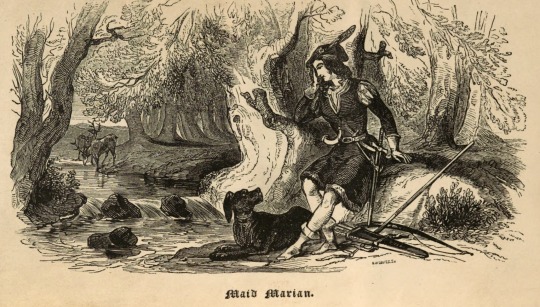
Later classic works include an active Marian as a member of the outlaw band, as well. Roger Lancelyn Green (1956), Charles E. Vivian (1927), and Paul Creswick (1917) all write a Marian who speaks for herself and works with the outlaws, often dressed as a man.
Hollywood enters the scene of Robin Hood retellings as early as 1908, but the oldest surviving Robin Hood film is Douglas Fairbanks’ Robin Hood (1922). This silent movie, groundbreaking in budget and sets, features Marian (played by Enid Bennet) as a strong character who holds her own throughout the film. After this, we see another groundbreaking film, The Adventures of Robin Hood (1938) starring Errol Flynn and Olivia de Havilland. This film is widely thought to be the gold standard of Robin Hood films, and I am definitely in that camp. Marian has more agency in this movie, and the lovely Olivia plays a rather coy noblewoman. While we don’t see her taking up a sword in this film, we see her developing the plan that ultimately rescues Robin from the hangman’s noose, successfully warning Robin and his men of Prince John’s plans, and standing her ground while on trial and defending her ideals. Yes, she is rescued from prison in the climax of the movie, but she also plays a vital role in rescuing Robin earlier in the story.

Robin Hood: Prince of Thieves (1991) begins with a woman of action, but at the end sees Marian rather helplessly forced into a marriage and moments away from being sexually assaulted when Robin literally catapults himself through the window to save her. 20 years later in Robin Hood (2010) Cate Blanchett’s Marian is fully capable in combat and is shown to be a responsible and dedicated lady of Loxley, working the fields and caring for her home.
Meanwhile in a contemporary TV adaptation, Marian is depicted as a Robin Hood figure herself, known as the Nightwatchman. (2006, BBC’s Robin Hood) Although the writers later did a disservice by (unpopularly) killing her character as a season finale, Marian was still depicted as competent and in charge of her own choices and actions, and in fact rescues herself from an unwanted marriage.

Contemporary Robin Hood literature also features an active Marian. Jennifer Roberson’s Lady of the Forest (1995) and Lady of Sherwood (1999) present Marian as a noblewoman who, over the course of the text, takes control of her own story in her capacity as a member of gentry, Lauren Johnson’s The Arrow of Sherwood (2013) sees an incredibly historically inclined retelling of the Robin Hood story, and includes a dedicated and politically savvy Marian. She doesn’t run into the forest, but makes a real difference through her smart decisions and political manipulation. Robin McKinely’s The Outlaws of Sherwood features Marian as an excellent archer, better than Robin, and she easily slips in and out of the outlaw camp as needed, is skilled in woodscraft, and is a valued and substantial member of the outlaw group. Honestly, I think it would be difficult to find a literary retelling that doesn’t include an active Marian character.
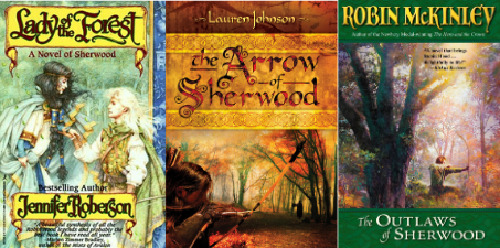
So where do our ideas of Marian as a damsel in distress ultimately come from? I have a few theories.
First, we see the archetype of damsels in distress throughout other fairy tales and folklore, so it’s tempting to assume that Marian is the same and portray her as such, and there are examples of her character playing that role either in whole, or for part of the narrative.
There are unfair assumptions made about medieval women in general, that ignore the powerful positions women could hold, and the amazing things that women did during this period. When people picture medieval women, they are often embroidering tapestries, being forced into unwanted marriages, being beaten by their husbands, and dying in childbirth. There is truth in stereotypes, but there’s also room for deeper understanding of the historical context, and a wider story to be told that includes women standing up for themselves and exercising their own strength and skills. (It’s not good feminism to overwrite real women’s history.)

We see this stereotype most often in movies and TV adaptations, which are highly visible and memorable, cementing ideas about the Robin Hood legend (and Marian) in the general psyche.
Children’s picture books, perhaps one of the first introductions a person might have to Robin Hood, tend to play out the story like a traditional fairy tale and Marian is again likely found in an upper tower, calling for help.
Some find it demeaning for Marian to ever require saving, or to be saved by anyone other than herself. I feel differently about this. People rely on other people, and it’s not inherently weak to ask for support from someone, especially from a romantic partner. The story of Robin Hood is good fun, but it’s also full of danger and peril. It’s not surprising that various characters need to be rescued by friends and lovers throughout various tales. Robin Hood, Little John, Will Stutely, Sir Richard of the Lea, Alan A Dale’s bride, and yes, Maid Marian. All of these characters have stories where they require smart and daring rescues, and they’re exciting stories! Because Alan’s bride and Marian are women, this does not exempt them from the support of their male friends. They deserve to have someone watching their back. I am not offended by Marian needing help; it’s not only human, it’s a staple for a multitude of characters in Robin Hood lore.
As with much of media, Marian is the single female in what’s otherwise mostly a boys’ club. She has been the single point of reference in this story for women for centuries. I find that incredible. She was my favorite character as a child because she was the only woman, the only person I could potentially see myself in. With a global story such as Robin Hood, that’s not an insignificant role. No matter what her part may be in any given retelling, there are pieces of women from centuries long past and not so distant. I find that fascinating, worth respecting, and that’s why she’s my favorite character to this day.
tldr: Drink your respect Maid Marian juice.
61 notes
·
View notes
Text
Friday 8 May 1840
8 ½
3
Rain in the night and the Place dirty this morning dampish foggy morning even till now 11 ¼ (breakfast at 9 55/..) – the mountains quite covered – then copied into business letter book the character given on leaving Moscow to Grotza, and that given to Gross at Astracan [Astrakhan’], and my letter from here to Mr. Marc – and then had Mademoiselle Kotzebue and then Madame Latchinoff till 2 5/.. – she had translated into French above ½ her account of her journey to Erivan and brought it and read it to me – prettily written – praised it very much – she will let me have the whole on Saturday night to take with me – and will leave for me (chez le general Braïko) her compilation of a sort of modern history or what of this country – She is writing a larger work, an historical work but in the form of a Roman – I questioned her as to why she did not take a higher line
of authorship – she dreaded criticism – nothing to fear for a Roman, if her style and manner easy and good, it was all that would be required – she writes, she says, with great facility, and always has done from her infancy – besides, to write history would require grave studies and much time and her father quizzes, and does not like the idea of a young woman of her age entering upon history writing – she ought to think of her husband – elle appartient à la société, and, if her studies were too serious they might either withdraw her from society or she might enter it préoceupée, and not be able to play the agreeable (faire l’aimable) – Bon! – But she travels up and down – leaves her husband perpetually – goes a month hence to Moscow – or 1st to Cachétie – then aux eaux? then Moscow by Warsaw and Vienna to Florence Rome and Naples for the winter – will keep a journal for herself and arrange her ideas afterwards – but it seems she adopts the novel style not only in imitation of Sir Walter Scott, but of her great friend, killed in an Expedition 2 or 3 years ago against the Tcherkess, Mr. Bestujeff one of the best modern writers of Russian historical romances – E.g. his Amahad Beg (translated into French) – under the nom supposé of Marlinksi – he was exiled for the Moscow business of 1825 – he and Pouschkine [Pouchkine] killed there years ago the 2 best modern Russian writers – Madame L- has only published one thing a little Roman (story) of 100pp. in the Bibliothèque de Lecture (a monthly periodical) du mois de Septembre 1838. Inquire for it chez Semen, Moscow – She writes under the nom suppose de Cléopatre Leonidoff – Captain Tolstoy was in a category that had almost the worst punishment – It is only 2 years since he was made officer – now Lieutenant – was 8 years here a private soldier – obliged to appear on parade in his soldiers dress – but all received in society (especially those who have money) and then wear clothes of fine cloth – He has only to distinguish himself – and rank goes on quickly here – a man may rise from Ensign to general in 5 years here – always the opportunity to distinguish himself – Madame L- has much read Walter Scotts works, and finds much resemblance between the Scots Highlander and Tcherkess – Mademoiselle Kotzebue called in fact about the Armenian Obuvian and the ascension of Mont Ararat – could say nothing certain at present all must depend upon time and weather – what give him a day + his expense – no satisfactory answer – but thought as he wished to go for his own pleasure he would be contented with his expense – but Madame L- said gentlemen understood these things better than ladies – I thought but said nothing would 1 ducat per day be enough to give? Koun and interpreters ask 60 Ducats per month = 2 Ducats per day – to call at the Kotzebues’ at 12 tomorrow – somehow I do not much like Mrs. L- no solid learning as [Miss] Kotzebue seemed to insinuate nor does she seem a general favorite here she is a silly little doll of absolute flirt – made as good a fetch as I could for the after address of Madame L- in vain – her husband will be here 4 or 5 years – she is always en voyage – her father and mother live in Moscow – have not yet learnt name or station – after 1812 the fashion to bring up young people à la Francaise – she one thus brought up – all her studies in French – hardly knew her own language – till 4 years ago – her friend Bestujeff said it was a shame for a Russian to write in French and she began to study her own language – it occurs to me she talked (wrote, read) of Erivan being “prise chez les [Perres]” instead of sur
SH:7/ML/E/24/0100
her own French translation of her work from the Russian will be valuable – when she is older, she says, she may retire a little from the world, and engage in more serious studies and write history – the compilation the history a fragments of this country she will leave for me chez les Braïko will be gleaned from the reports of various officers and from authentic archives; and she is sure this little work will be very interesting – tis now 3 p.m. damp rather Rainy dirty day – dinner about 5 ¼ - before and after wrote to countess A.P- had Mr. Stadler – to come again in the evening – came at
he wrote the names as under of the 2 gentlemen at the Gymnase –
Inspecteur Roskovshenko, le directeur [?] et le traductor de Shakespeare –
or after 9 – tea – translated Spaskis’ book for me – staid till 2 20/.. ! damp rainy day
5 notes
·
View notes
Photo
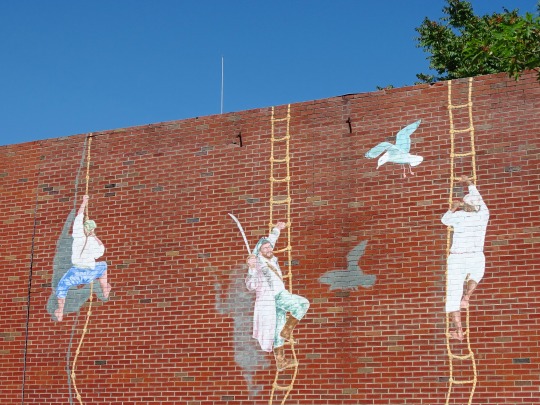

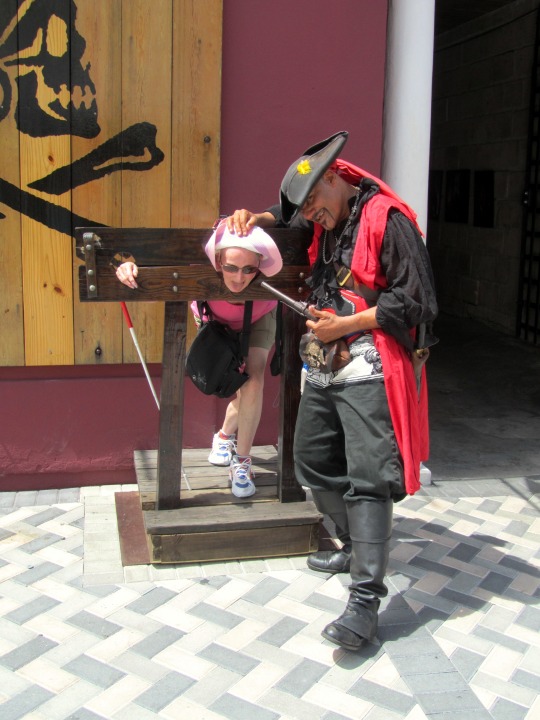


International Talk Like a Pirate Day
Yar harrr! Ahoy there ye lily livered blaggards! It be Talk Like A Pirate Day, and that means it’s time for pillaging and the imbibing of rum!
Pirates have been all the rage in recent years and out of that particular fascination came an insane and completely pirate-oriented idea: that there should be a day dedicated to keeping the piratical language alive and, more importantly, the tradition of all things related to pirates.
So Talk Like a Pirate Day was invented. And now it’s time to celebrate with all of the pirate talk that can be mustered in one day!
History of Talk Like A Pirate Day
It was June 6, 1995, and a group of men were playing racquetball at Albany in Oregon. All throughout they were shouting encouragement to each other. On this particular day, for reasons unbeknownst to them, they started shouting piratical slang at each other. From there it just kind of took on a life of its own, and they realized by the end of the game that it was necessary that they establish a holiday to celebrate that encouraged the use of such a fine vernacular. The first thing they needed was a date, and it just so happened that the date selected was the birthday of his ex-wife.
For the next seven years they honored this holiday, in relative obscurity, until they happened upon the email address of one Dave Barry, a syndicated columnist and author of a great number of books. He also happened to be hilarious, like any good pirate should be. From there it’s all history, Dave Barry promoted the holiday, and it’s been one amazing year after another as people all over the country celebrate this auspicious holiday.
How to Celebrate Talk Like A Pirate Day
Getting involved with this day is sure to be a LOAD of fun! Because it’s just a silly day, be sure to involve all of the pirate-like silliness that can be mustered. Try out some of these ideas for enjoying Talk Like a Pirate Day:
Talk Like a Pirate
Ahoy, Matey! This obvious application of the celebration might be a little more difficult than one might think. Because, who actually knows what pirates sound like when they talk?! Some phrases are more commonly known, like “pillage” or “landlubber”. But others are a little harder to understand. Here’s some vocabulary and lingo to help get novice pirate talkers started:
“Son of a Biscuit Eater”. This is what pirates might call someone they don’t like, the idea being that a biscuit eater is refined and, well, not a pirate.
“All Hand Hoy!” Upon hearing this, everyone needs to get on deck to help out.
“Bring a Spring Upon ‘er”. A phrase meaning to turn the ship in another direction.
“Grog Blossom”. A person who has a red nose because they drink too much alcohol (probably rum).
Read Some Pirate Tales
Even people who are land-dwellers can certainly use their imaginations to read about different pirates and their escapades. From classic to modern, stories about pirates are bound to be exciting and adventurous! Surely reading some books about pirates will help to build up that Talk Like a Pirate Day vocabulary.
Take a look at these classic pirate novels to get started:
Treasure Island by Robert Louis Stevenson. The Scottish author brought pirates to life in 1881 with his talk of buccaneers and buried gold.
Peter Pan by JM Barrie. Infused with run-ins with Captain Hook, the original Peter Pan stories from 1904 are much darker than the Disney animated remake films.
The Pirate by Sir Walter Scott. Written by another Scottish author, this 1821 novel features Captain Cleveland, a shipwrecked captain in the setting of the island of Shetland.
The Life, Adventures, and Piracies of the Famous Captain Singleton by Daniel Defoe. The first book written on this list, the 1720 book tells the story of an Englishman who was stolen, raised by gypsies, and eventually takes to life on the sea.
Watch Pirate Films
Not into reading? That’s okay! Plenty of films about pirates have been created so that individuals and groups can spend a couple of hours hearing all kinds of pirate-speak.
The Pirates of the Caribbean series of films can take up a nice chunk of time with its 6 different movies in the franchise. Or for an inspiring one-off, try a modern day somewhat-true-to life pirate story starring Tom Hanks, Captain Phillips.
Invite Friends to Celebrate All Things Piratey
Well mate, celebrating talk like a pirate day can be as easy as a day in the tropic. Simply work to turn up that pirate-speak vernacular, pour a few fruity drinks with umbrellas in them, and gather with friends to celebrate the day in your piratey best clothing! There are songs to be sung and wenches to be clenched, and who can resist a backyard barbecue with grilled pineapple, salmon made by walkin’ the plank, and a perhaps inappropriately large amount of pure sugar cane rum? Talk Like A Pirate Day is comin’, are you ready to pirate it up? This is certainly the perfect day for it!
Source
#New England Pirate Museum mural#Salem#Massachusetts#New England#USA#summer 2018#original photography#travel#vacation#Pirate's Museum#Nassau#The Bahamas#2013#San Francisco#California#San Francisco Maritime National Historical Park#ship#sailing ship#International Talk Like a Pirate Day#InternationalTalkLikeAPirateDay#19 September#architecture#cityscape
1 note
·
View note
Text
Kiss from a Rose
A Valentine’s Day adventure

Pairing - Bastien Lykel and Sophia Turner from my TRR AU of Protect and Serve and Silver Service.
This is a three part fic, the final chapter will be posted on Valentine’s day. Exceptionally fluffy with a good dose of smut in the final chapter - so
NO UNDER 18s PLEASE
This chapter features my good Tumblr friend @drakeandcamilleofvaltoria or Erin, as it’s set in her home city, Edinburgh, which I visit regularly. Many thanks to her for letting me know the trendy places to go. I hope you enjoy it, darling xx
If you haven’t read any previous works with Sophia and Bastien, all you need to know is that this takes place after Anton has been on trial and locked away. Riley ended up with Drake and Liam is involved loosely with Olivia. Sophia is a member of staff at the Royal Palace in Cordonia who joined shortly before the social season that Riley took part in. She is English and the devoted LI of head of the King’s Guard Bastien Lykel.
Word Count 4027
1 Athens of the North
‘What do you mean, you’ll be passing over us?’ Sophia’s mother’s voice was shrill at the other end of the phone line. ‘Are you flying in the Royal Jet?’ Sophia squeezed the bridge of her nose.
‘It’s okay Mum, don’t get so excited. King Liam will be visiting Queen Elizabeth at Holyrood later this year, and Bastien has to go over to liaise with her security team. I’m going with him – and yes, it will be in the Royal Jet so I’ll be in Edinburgh next week. I’m sorry we won’t be able to stop off and see you, time is tight - but if you want to fly up…’
‘Me, fly again?’ her mother’s voice was still shrill ‘I still haven’t got over that ghastly flight over the Alps in December’ Sophia groaned. Her mother was not a good traveller at the best of times, and Christmas time had not been a good choice. Her father had told her of the turbulence they had encountered on the way back, which made her mother fear another trip.
‘Well never mind, perhaps we can come and visit you later in the year’ Sophia sighed. Bastien frowned at her and tapped his wrist. ‘I’m sorry Mum, I have to go. Give my love to Dad – yes – love you lots – bye…’ She dropped her head in frustration.
‘I’m sorry theá mou, that didn’t sound harmonious’ Bastien said
‘No, she’s still going on about the flight back last time’ Sophia sighed ‘But it does mean we’ll have some time to ourselves in Edinburgh’ In the back of her mind she wondered what might be on the itinerary, as they would be there for Valentine’s day. She didn’t presume that her lover would do anything to celebrate it as he would be working a lot of the time, but she knew he never missed an opportunity to make her feel special. He walked over and drew her into his arms.
‘I’m sorry Sophia, I don’t know how much time I’ll have to spend with you’ he replied.
‘It’s fine, Erin and I can catch up. It will be good to see her again, and I can see my friend Les too’
She knew the city well, having spent some time researching for her college thesis in the library there and taking a job later on in her career. It would be cold compared to Cordonia, and possibly wet and windy, but you never could tell with British weather. They might be lucky and hit a mild spell, or it could very well feel like all four seasons in one day. The city wasn’t big, and a shopping trip or a tour of Art galleries were both possible in bad conditions. She was excited to be going back there with Bastien and her friends.
------
Sophia settled down into the plush leather seat and buckled herself in. It was her first time on the royal jet, and she was delighted to have so much space. Bastien sat facing her, and Drake and Riley had seats on the other side of the aisle. They would be staying in Edinburgh at a different hotel before carrying on to a regular flight to New York afterwards. It was the day before Valentine’s Day.
‘This is rather special’ she smiled, and Bastien squeezed her hand. She was not a nervous flyer, and looked forward to looking out at the view when they took off.
‘I barely travel on regular flights’ Bastien said ‘I must admit it’s good not to have to queue or check your bags in, and to have plenty of leg space.’
Happily, a plane journey with Bastien was more pleasant than a road trip. He pointed out various landmarks as they flew toward the English Channel, when she was thrilled to fly over the island where her parents still lived, and on which she grew up. After that it was Sophia who pointed things of significance out to the other three. Bastien smiled to see her so excited to be visiting her home country. She had been born in the Midlands and she and her parents had moved to the tiny island in the English channel when she was little. She had gone to university in the north of England, and worked in Scotland before she had applied for the job in Cordonia. Despite the length of the journey, it didn’t seem long before they were taxiing along the runway. They were only a short tram ride away from the city centre, but they took a taxi which dropped Drake and Riley off at their hotel on Regent’s Terrace before taking Bastien and Sophia to the prestigious Balmoral Hotel right in the centre of the city on the main thoroughfare, Princes Street.
Bastien would be visiting the palace the next day to liaise with his counterpart there, but they had the afternoon and evening to settle into their hotel and perhaps do a little sightseeing. The car drew into a service entrance before they could get out, and their luggage was whisked away to their rooms while they checked in at reception. Sophia was delighted with their suite, which looked out over the famous Edinburgh Castle and along Princes Street, taking in the tall monument to Sir Walter Scott, famous writer of many books in his time. They had their own lounge as well as a huge bathroom with a walk in shower and corner bathtub.
As soon as the door had closed, Sophia flung her arms around Bastien’s neck for a passionate kiss.
‘My goddess’ he smiled as they stopped for air ‘I feel you’re very eager to put me through my paces’
‘We didn’t manage to join the mile high club’ she said in a sultry tone ‘So the least you can do is make love to me in a five star hotel with a stunning view of a historic landmark or two’
‘Nothing would give me greater pleasure’ he growled, loosening his tie.
------
Sophia had a glow and a spring in her step as she and Bastien made their way up the steep steps of Calton Hill which overlooked the city and held the famous national monument, observatory and Nelson’s Tower. The observatory at the very top had been developed recently and featured a new restaurant with extensive views through a huge ninety degree picture window, and Bastien had booked a table for the two of them.
Sophia caught onto Bastien’s arm as he negotiated the steps with his cane, but it was more to offer support if he needed it than to drag at him. He smiled, knowing her little trick and appreciating how caring she was. The higher they went, the more his thigh ached, but it was not challenging enough to slow him down much. He believed it was improving, and were he to come in a year’s time, he might make it to the top without any discomfort.
They were soon sitting overlooking the lights of the city as the light faded. The sun had set quietly and without spectacle. The hill was very popular with tourists and photographers alike, and many a photo had been taken and posted online and shared around the world. Perhaps the morning would bring colour in the sky, or the next afternoon – as it was February the sun would set in the late afternoon and rise around eight in the morning, so it wasn’t challenging to try and catch a spectacular shot.
‘This place was more or less derelict when I worked here’ Sophia explained to Bastien. ‘This is such an improvement. I’m looking forward to seeing inside the observatory in the morning.’ Bastien was reading the menu, and she reached toward him over the table. He took her hand without even looking away from the menu. Her eyes prickled, her heart skipped a beat and she squeezed his fingers. He looked over at her, puzzled.
‘What?’ he asked.
‘I love you, Bastien Lykel’ she said softly. She picked his hand up and kissed it and he responded by taking hers and drawing it to his chest.
‘And I you – with all my heart, my goddess’ he affirmed. They smiled fondly, lost in each other’s gaze for a few moments.
‘Sir, Madam, are you ready to order?’ Sophia jumped as the waiter spoke. She wondered how long he had been standing waiting for them to notice him. She had barely skimmed the menu, but Bastien had it all under control
‘We’ll have a bottle of champagne – the Veuve Cliquot - and the tasting menu’ he said. The waiter nodded and turned away. ‘The tasting menu has a small portion of everything to try’ Bastien explained in a low voice. ‘The couple on the table in the corner have it – the portions aren’t over generous but I’m sure you won’t mind that’ His eyes sparked, and she coloured, knowing that he wasn’t talking about sating just one appetite. She rarely over ate because it meant less opportunity to make love – a full belly was not compatible with their libidos.
‘I don’t know’ she said in a low tone ‘we need to keep our strength up’ Underneath the table she stretched out her leg and rubbed his ankle with her foot.
‘Room service is available twenty four hours’ he rumbled, leaning toward her. At that point the waiter arrived with the champagne and poured a little for Bastien to test, and he leaned back in his chair.
‘For the lady too?’ the waiter asked when the guard looked up at him and frowned slightly. He nodded and poured a little for her too. There was a flash of amusement in Bastien’s eyes as they both sipped.
‘What do you think, my sweet?’ he asked, and she furrowed her brow, pausing for a moment as she kept the wine in her mouth and rolled it around. She wasn’t sure if it was the correct procedure for champagne, but she hoped her bluff convinced the waiter. She swallowed, making a face of approval. She certainly wasn’t about to spit it out as she had seen some doing. Casting her mind back, she remembered Riley had lessons in wine tasting with the Beaumonts back when she was representing them in the social season. She resolved to ask her about it later.
‘Acceptable’ she nodded gravely, and the waiter poured more for both of them before leaving them to drink it. The main feature of the menu was that every ingredient was locally sourced, and it made for a very interesting range of dishes. Before long, the starters arrived – three small plates bearing food, and an empty plate each to sample the dishes. The waiter described the dishes for them, and instead of serving any of it out onto their plates, Bastien gave her a little to taste. There was a dish of trout with an accompanying relish, one of artichoke, ricotta and hazelnuts, and one of raw beef with wild garlic. She decided she liked the trout best and the beef least, so Bastien served her a little of the beef, halved the artichoke dish, and gave her most of the trout.
The food was not over generous as Bastien had said, but what it lacked in quantity it more than made up for in taste and texture. Sophia rolled her eyes and curled her toes at the delicately balanced flavours. Bastien looked at her in amusement.
‘What is it?’ she asked. His eyes flashed with amusement as he leaned closer to speak quietly.
‘You made that face only a couple of hours ago in our hotel suite’ Her eyes widened.
‘You mean – that’s my…’ she stopped ‘I make that expression when I…’ Bastien was trying hard not to laugh out loud, but he was very amused as his goddess flushed red. ‘You’re teasing me’ she hissed, but he shook his head and put his hand on his heart.
‘I speak the truth’ he whispered, and Sophia huffed.
‘Well you taste it’ she said, slightly miffed. Bastien was still trying not to laugh, but he took a small mouthful, rolling his eyes and mimicking her expression. She kicked him under the table, making sure it was his ‘good’ leg.
‘Just like that’ he teased. He gathered himself together ‘I’m sorry Sophia’ he said ‘Truly, it’s not exactly the same, but it is very similar’ She scowled a little, and he reached across the table to take her hand ‘It’s wonderful’ he said ‘I love that face. It means you’re happy, and if you’re happy, so am I’ Sophia tilted her head to the side, her expression softening a little.
‘Okay, I’ll consider forgiving you for laughing at me’ she said reluctantly. The waiter reappeared to clear their plates away, and it wasn’t long before the main course came. This time the options were scallops, crab and langoustine, and wild duck. Sophia was pleased at the selection of seafood, and this time Bastien just split each dish evenly. At the first taste, Sophia rolled her eyes again, but this time she exaggerated it, and under the table she slipped her shoe off and rubbed Bastien’s ankle. She made a sound of appreciation, and was rewarded by watching him nervously try to loosen his tie, looking sideways at the other diners.
‘This is divine’ she breathed, putting as much feeling into her words as she could. Bastien swallowed and his eyes darkened. He leaned over the table toward her
‘I think you’ve paid me back with interest’ he said quietly ‘any more of that and I’ll be tempted to clear the table and…’
‘Is everything okay with your meal, Sir?’ The waiter appeared at Bastien’s side, and he jumped. He recovered quickly, clearing his throat and answering
‘Yes, it’s excellent – pass our appreciation on to the chef please’
‘Certainly Sir – more champagne?’ he asked, as although their glasses were full, the bottle was empty.
‘No thankyou, but if you have a bottle of Glenkinchie I’ll have a glass with water on the side please.’ He glanced at Sophia ‘Will you try a glass of whiskey, my dear?’ Sophia smiled sweetly.
‘Of course, darling’ She gave Bastien’s ankle another nudge, and he drew it back out of her reach with a stern look. She sighed and carried on eating and sipping at the cool effervescent wine, savouring every mouthful. They finished their main course in silence, but they had attained a truce for the moment. The champagne finished, the whiskey was brought over in cut glass tumblers with a jug of water. Bastien took a tiny sip of the neat spirit before adding a drop of water, picking the glass up again and inhaling the aroma.
The dessert menu arrived, and Sophia beamed with anticipation. She had a sweet tooth though Bastien did not, but he often shared dishes with her, making the excuse that it would keep her waistline trim.
‘Though I would love you whatever shape you were’ he would affirm, and Sophia would eye him warily but say nothing. She looked at the menu in confusion. Bastien cocked an eyebrow at her. She leaned over and whispered
‘I have absolutely no idea what any of these things are’ she confided ‘or at least I can recognise the words – it is English after all – but it doesn’t sound very inspiring’ she looked down the list ‘What on earth is ‘Elric’s log’? I can’t tell you what I think it might be.’
‘I’m sure the waiter will enlighten us’ Bastien assured her, but she made a face. At that moment, Bastien’s phone chimed with a text message. He looked at it briefly, seeing it was a text from Drake. Sophia spoke before he could tell her.
‘Can we leave dessert?’ she asked, keeping her voice low ‘I have a much better idea’ Bastien frowned, but he saw her earnest expression. He looked over at the waiter and raised a hand to beckon him over.
‘Can we have the bill please?’ he asked
‘But sir, you haven’t had dessert yet’ Bastien pursed his lips and looked at his phone
‘Unfortunately I’ve been called away on important business, I have to go as soon as I can’
‘I’m so sorry Sir.’ The waiter said with concern ‘I’ll get the bill immediately’
Minutes later, the two of them walked back down the hill arm in arm. Sophia was used to the cooler climate and wore a tweed jacket and a knitted cashmere hat, but Bastien found it cold and wore a stylish Italian wool coat that just skimmed his knees, and a woollen hat and thick scarf, whereas Sophia’s scarf was more for show than warmth. Their breath showed in the cool air, but it was still and the stars shone brightly.
‘I’m sorry Bas – I know you’re not fond of dessert anyway, but it was just so - pretentious. I hope they didn’t charge you’ Sophia said apologetically
‘No, but they were a bit stressed trying to work out the new charges’ he said ‘I tipped them so they got almost the same as if we’d had everything and not tipped, so they can’t be too upset.’ He squeezed her hand ‘So, what was your idea for an alternative?’
‘Gelato’ her eyes shone ‘There’s an Italian restaurant very close – not even as far as the hotel – that makes award winning gelato’
‘I’m actually very partial’ he smiled. Her eyes it up
‘That’s wonderful! I used to go with Mark for pizza’ she said thoughtfully ‘The portions were so generous I never had room for gelato’ Bastien felt an unaccustomed stab of jealousy at the mention of her former lover. She felt him tense, and hugged his arm tighter.
‘I’m so happy to be here with you’ she said ‘There are lots of places to show you – we can make new memories together’ He smiled fondly, reassured of her affection.
‘I hope I won’t be kept too late tomorrow. You can show Drake and Riley round if you like, and with luck I’ll see you for dinner’
‘I’ve seen round Holyrood Palace’ she said ‘But of course you’ll be working in the parts the public don’t get to see’
‘I’m sorry they won’t allow me to take you round’ he said ‘They are extremely strict as to who enters, and with good cause’ Sophia shrugged as they came to the restaurant. The décor was oddly reminiscent of an American diner, but the staff were all Italian, and the menu was too.
‘Here we are’ she said, ‘Let’s hope they aren’t busy, it’s too cold to wander the streets with gelato’ Luckily it was quiet and they were able to take a table after ordering a scoop each. Sophia chose prosecco and strawberry and Bastien had panacotta and salted caramel, and they shared.
‘Really you can’t beat mint choc chip’ Sophia asserted ‘but I can’t resist trying this one’
‘I favour double chocolate chip’ Bastien said ‘but this is acceptable’
‘I’ll come in with Les tomorrow and try a sundae’ Sophia said ‘I don’t have room for one right now.’
‘That’s an excellent idea’ Bastien smiled ‘Drake and Riley are at a place called the Black Bull just around the corner, we can pick them up there. Where are we going next?’
‘We’re meeting Erin at a place called Tiger Lily on George Street’ she said ‘It’s about ten minutes’ walk away. I’ve not been there – it’s new, but places open and close all the time’ The two finished their dessert and met Drake and Riley at the Black Bull, which turned out to be similar to the place Riley used to work at in New York – a creditable dive bar frequented largely by bikers in studded leather jackets - before they set off across the city. Although the shops were closed, there were plenty of revellers walking around going to the many bars and restaurants and clubs. Soon they had reached their destination and her friend stood up from their table to wave them over. She was blonde and petite, and had similar looks to Sophia. Her partner was much taller – about the same height as Bastien. His hair was lighter, his shoulders as broad as the older man’s.
‘Sophia – it’s so good to see you’ Erin cried, throwing her arms around her before pulling away to introduce her partner ‘This is Sean – Sean, Sophia’
‘Nice to meet you’ Sophia replied, shaking his hand, and indicated the others ‘This is my partner Bastien, and I told you about Drake and Riley’ Erin’s eyes flicked to Bastien, and he reached out his hand and shook hers firmly. Her eyes widened a little in awe before she turned to Drake – and flushed red to the roots of her hair. Their handshake lingered a little longer, and Sophia nudged her, clearing her throat. She seemed to be having trouble tearing her eyes away from him, but at last she did, turning to Riley, who gave her a sharp look as they clasped hands. Erin looked back to Sean and took his arm affectionately as if to reassure him as he in turn shook hands with the others, and Riley visibly relaxed.
‘How are you finding Edinburgh? asked Erin as they all sat
‘I’ve been before, very briefly’ said Bastien. ‘I find it intriguing – the old town and the new town.’
‘It’s an incredible place’ Riley affirmed ‘It’s just oozing with history – and I can see where JK Rowling got her inspiration for Harry Potter’
‘You have some great dive bars’ grinned Drake ‘and the whiskey…’ he rolled his eyes ‘I’m in heaven’
‘This is a lovely place’ Bastien waved around at the plush surroundings – notably the ceiling covered in decorative cherry blossoms, the marble bar and dark wood tables, low walled booths upholstered with padded leather, the pillars covered with mosaic mirrors, the bright modern lighting.
‘It’s rather special’ Erin smiled, and looked thoughtful for a moment ‘I don’t know what you’re used to, but there’s no table service here - you need to go to the bar to order drinks’
‘Oh, I see - I’ll get the next round’ Bastien offered ‘What do you want, ladies?’ Sophia was looking at the cocktail menu, perplexed, but Erin was ready
‘I’ll have a glass of Chardonnay please, Bastien’ He nodded and turned to Sophia
‘There’s far too much choice’ she said ‘I’ll have a glass of prosecco, that shouldn’t be too challenging’
‘Sophia honey, you need to live a little!’ cried Riley ‘Bastien may have to work tomorrow, but the rest of us are as free as birds, it’s the weekend’ She nudged her ‘I’ll choose for you, darling’
‘Really, I’ve already had champagne and whiskey’ she protested ‘and I hate hangovers, they’re such a waste of time’ She looked at the list again. Bastien was beginning to realise that Sophia was often overwhelmed when given a choice – the menu at the restaurant had been too much for her as well.
‘Have an old fashioned’ Bastien suggested ‘That’s whiskey based, but with soda so it’s a longer drink’
‘I’ll have a Manhatten’ grinned Riley
‘You should try a Gentleman’s Agreement, that’s whiskey based’ Sean piped up ‘I tried it first time I brought Erin here. It’s the best I’ve ever tasted’
‘It was our first date’ she smiled, squeezing his hand.
‘Thank you Sean, I like the name’ Bastien responded. ‘Does that sound good to you?’ he asked Drake, who nodded enthusiastically, and Bastien rose from his seat ‘I’ll be back shortly’ Sophia shifted toward the end of the leather upholstered bench.
‘I just need to go to the Ladies’ she said ‘Where is it, Erin?’
‘It’s past the bar to the right’ she replied, and Sophia made her way past the bar to find the bathroom. She soon came back out to see Bastien still at the bar, waiting for his order. She was about to make her way over to help him carry the drinks back to their table, when she heard a familiar male voice that froze her in her tracks, hair on the back of her neck prickling.
‘Sophia? Sophia, is that you?’
46 notes
·
View notes
Note
12, 17, 26
Thank you for these Allie!!!
12. Do you need to finish a book before you can move on to the next one, or will you have multiple books going at once?
I sometimes have multiple books going at once but ideally i best operate reading one book at a time?? idk it’s just easier for me to focus that way, like i know if i try to read multiple books at once it’s going to take even longer to finish all of them whereas doing one book at a time is more efficient for me, idk. I do currently have two books I’m reading, murder on the orient express and a poetry collection, but i’m putting the poetry collection on hold until i finish the agatha christie novel anyway lol
17. Do you know any poetry by heart?
LOL I WISH i do know the first line of the Canterbury Tales prologue which is something like whan that aprill with his shores shote or something like that bc we had to memorize the first like twenty lines for bonus credit in a 10th grade english class but that’s really all i remember skdjfnsdkfsnd
26. A book you studied in school and ended up loving?
Shit so many actually lol i’m a huge nerd who liked pretty much everything they read in school... sorry bout it... uhhhhh idk if i can remember all of them tbh considering both my majors required like a shitton of reading but imma do my best!
High school:
Devil in the White City - Eric Larksen
The Great Gatsby - F Scott Fitzgerald
Pride and Prejudice - Jane Austen
The Night Circus - Erin Morgenstern
One Flew Over the Cuckoo’s Nest - Ken Kesey
Hamlet (play) - William Shakespeare
College [english]:
The Bride of Lamermoor - Sir Walter Scott
Persuasion - Jane Austen
Sula - Toni Morrison
I, Tituba, Black Witch of Salem - Maryse Conde
The Handmaid’s Tale - Margaret Atwood
To Kill a Mockingbird - Harper Lee
Nervous Conditions - Tsitsi Dangarembga
We Need New Names - NoViolet Bulawayo
The God of Small Things - Arundhati Roy
Cloud Nine (play) - Caryl Churchill
Mrs. Dalloway - Virginia Woolf
Clifford’s Blues - John A Williams
Notes of a Native Son - James Baldwin
Maus - Art Spiegelman
The Photographer - Didier Lefèvre, Emmanuel Guibert, and Frédéric Lemercier
College [anthropology]:
With Respect to Sex: Negotiating Hijra Identity in South India - Gayatra Reddy
Of Two Minds: An Anthropologist Looks at American Psychiatry - Tanya Luhrmann
Righteous Dopefiend - Jeff Schonberg and Philippe Bourgois
Bookish asks!
#i'm CERTAIN i'm missing books on question 26 but my memory is really the worst#thank you for this!!!#answers#thelibraryiscool
6 notes
·
View notes
Text
Star Trek II: The Wrath of Khan (1982) Review
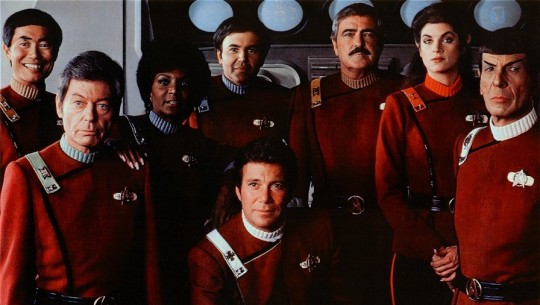
[This review includes big honking spoilers.]
Spock: "I never took the Kobayashi Maru test until now. What do you think of my solution?"
The Wrath of Khan is a favorite of many fans, and it deserves to be. It is exactly what a big Star Trek movie should have been, and finally was.
Why is this movie so good? Bunches of reasons. Like an exciting story that had personal significance to the main characters, terrific writing, an outstanding villain, and the intensely moving death of the most beloved character in the series. I can't get through this movie without crying, and I've seen it a dozen times.
Birthdays, old age, death and loss, passing the torch to the next generation, it was courageous of the franchise to make these things the center of the movie, instead of ignoring the fact that it was fifteen years after the series and the cast was getting older. The Wrath of Khan is beautifully bookended by the Kobayashi Maru no-win scenario at the beginning, basically the arrogance of youth believing that they will never die, and a no-win real life situation at the end for Kirk when he loses Spock, his closest friend, the other half of himself.
When you watch the movie knowing the ending, you can see Spock's death coming. There are so many references to dying. The first thing Kirk says to Spock is, "Aren't you dead?" And we can see on Spock's face the moment he realizes what must happen in order to save the ship. He just gets up and goes to his death without a word to anyone, a very Spock-like thing to do. He even has to trick McCoy in order to carry out his plan, which for me, makes it even harder to take. The way he stands and straightens his uniform, those final moments where he and Kirk are separated by glass, it always gets to me. It was an exceptional death for an exceptional character. I can remember when I first saw it, I was absolutely devastated. William Shatner and Leonard Nimoy were at their best in that scene.
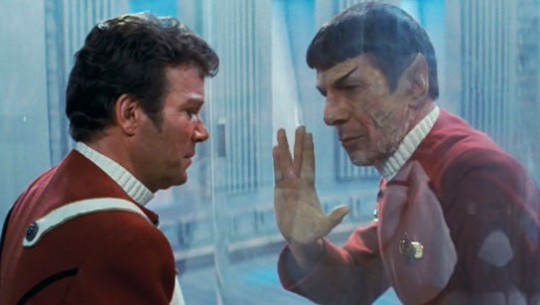
And yet, there is the obvious hint that it's not over for Spock. There was the way he touched the unconscious McCoy's face and said, "Remember," a deliberate call-back to "Requiem for Methuselah." The pod containing his body was lying on the grass of a vibrant new world that hadn't existed an hour before. They just couldn't bear to write Spock out completely, could they? (Not that I'm criticizing. I couldn't, either.)
As Kirk faced aging and death, pretty much for the first time, there was the complementary plot of passing the torch to the next generation. It was believable that Kirk would have had a child somewhere along the line, and it delighted me that his ex-amour was the most brilliant scientist in the Federation. David Marcus felt like he could have been Kirk's son, and I liked that Kirk did exactly as Carol had requested -- he stayed out of David's life and let Carol raise him alone. In an obvious parallel, Spock was mentoring his young protege, the competent, professional and often amusing regulation-quoting Lieutenant Saavik. The feminist in me can't help pointing out, with the exception of the comments about her hairstyle in the turbolift, Saavik could have easily been played by a man without changing a single other detail.

All this, and I haven't even gotten to one of the best things about this movie – and that's Ricardo Montalban reprising his character Khan from the original series episode "Space Seed." His performance was so strong and so intense (and his chest so amazing) that there has yet to be a Star Trek villain that can top him.
And the supporting cast was terrific: DeForest Kelley was a delight as McCoy. James Doohan did a fine job with a wonderful dramatic scene when he lost his nephew. Bibi Besch did well in the key role of Carol Marcus, Merritt Butrick as David Marcus was pretty much perfect, and we also got Paul Winfield as the unfortunate Captain Terrell and future television star Kirstie Alley in her acting debut as Saavik. And yes, Chekov recognized Khan but Chekov wasn't in "Space Seed." I honestly don't care, since it wasn't important to the plot, and Walter Koenig's performance as Chekov in this movie is probably his best. (I only started liking Walter Koenig after his villainously wonderful continuing role in Babylon 5.)
Unlike Star Trek: The Motion Picture, The Wrath of Khan never stops moving. The space battles are terrific, the gimmick with the prefix code and the scenes in the Mutara Nebula all work, the musical score is outstanding, and best of all, the effects still hold up. (Although the close-ups of the ears during the Botany Bay scenes don't. Ah, well.)
I love this movie. The Wrath of Khan and the two movies that completed the trilogy are the pinnacle of original Star Trek, incorporating the best aspects of the original series. They're wonderful. In my not so humble opinion.
Bits and pieces:
— Stardate 8130.3 to 8141.6. The Reliant, space station Regula 1, Ceti Alpha 5 (not 6), and the Mutara nebula.
— Star Trek: The Motion Picture was set two and a half years after the end of the series, but here it was established that it had been 15 years since "Space Seed". Khan mentioned his "beloved wife," which would have been Lt. Marla McGivers.
— The Genesis presentation was exceptional. Best commercial ever. I'd buy it.
— I loved the way they used the rare book and the antique glasses as a reminder of the fact that Kirk was getting older. I also loved the level of detail in the furnishings in Kirk's apartment, as well as the huge mosaic IDIC in Spock's quarters.
— The ear thingies were the Alien chestburster of their time. Ick.
— Khan's use of the lines from Moby Dick were set up by the mini-library aboard the Botany Bay: Moby Dick, Paradise Lost, Dante's Inferno. And all books relevant to what happened to the Botany Bay.
— Kyle from the original series was a crew member on Reliant.
— Although the theatrical version is fine, I prefer the director's cut. It includes just a few little extra scenes, but one in particular – the introduction of Midshipman Preston as Scotty's nephew – makes a difference.
— Even the costumes were great. I particularly liked the white flap on Kirk's uniform stained with Peter Preston's blood; it was a striking visual.
— The Genesis cave scene is wonderful. But I've always wondered: where did the light come from?
Quotes:
Kirk: "A no-win situation is a possibility every commander may face. Has that never occurred to you?"
Saavik: "No, sir. It has not."
Kirk: "And how we deal with death is at least as important as how we deal with life, wouldn't you say?"
Saavik: "As I indicated, Admiral, that thought had not occurred to me."
Kirk: "Well, now you have something new to think about. Carry on."
Dr. McCoy: "Admiral, wouldn't it be easier to just put an experienced crew back on the ship?"
Kirk: "Galloping around the cosmos is a game for the young, Doctor."
Uhura: "Now what is that supposed to mean?"
David: "Remember that overgrown boy scout you used to hang around with? That's exactly the kind of guy..."
Carol: "Listen, kiddo. Jim Kirk was many things, but he was never a boy scout."
Kirk: "Mr. Scott, you old space dog. You're well?"
Scotty: "Oh, I had a wee bout, sir, but, Doctor McCoy pulled me through."
Kirk: "Wee bout of what?"
McCoy: "Shore leave, Admiral."
(Kirk tensely watches as Saavik takes Enterprise out of space dock.)
McCoy: "Would you like a tranquilizer?"
Kirk: "I would not presume to debate you."
Spock: "That is wise. Were I to invoke logic, however, logic clearly dictates that the needs of the many outweigh the needs of the few."
Kirk: "Or the one."
Spock: "You are my superior officer. You are also my friend. I have been and always shall be yours."
Khan: "I'll chase him around the Antares maelstrom and round Nibia and round Perdition's Flame before I give him up!"
Spock: "As a matter of cosmic history, it has always been easier to destroy than to create."
McCoy: "Not anymore. Now we can do both at the same time. According to myth, the Earth was created in six days. Now watch out, here comes Genesis! We'll do it for you in six minutes!"
Spock: "Really, Dr. McCoy. You must learn to govern your passions. They will be your undoing."
Khan: "Let them eat static."
Khan: "Ah, Kirk, my old friend. Do you know the Klingon proverb that tells us revenge is a dish that is best served cold? It is very cold in space."
Spock: "Jim, be careful."
McCoy: "We will!"
Kirk: "KKKHHHHHAAAAAAAAAAAAAANNNNN!!!!!"
:)
Carol: "Can I cook, or can't I?"
Saavik: "On the test, sir... will you tell me what you did? I would really like to know."
McCoy: "Lieutenant, you are looking at the only Starfleet cadet who ever beat the no-win scenario." (gestures at Kirk)
Saavik: "How?"
Kirk: "I reprogrammed the simulation so it was possible to rescue the ship."
Saavik: "What?"
David: "He cheated."
Kirk: "I changed the conditions of the test. Got a commendation for original thinking. I don't like to lose."
Saavik: "Then you never faced that situation... faced death."
Kirk: "I don't believe in the no-win scenario."
Khan: "To the last, I will grapple with thee. From Hell's heart, I stab at thee! For hate's sake, I spit my last breath at thee!"
Montalban makes these lines from Moby Dick work. How many actors could pull off lines like this?
McCoy: "He's not really dead as long as we remember him."
Kirk: "It's a far, far better thing I do than I have ever done before. A far better resting place that I go to than I have ever known."
Carol: "Is that a poem?"
Kirk: "No. Something Spock was trying to tell me, on my birthday."
McCoy: "You okay, Jim? How do you feel?"
Kirk: "Young. I feel young."
It isn't necessary to have seen "Space Seed" or Star Trek: The Motion Picture to follow this movie. In fact, it isn't really necessary to have seen the original series to follow this movie. And you don't even need to watch Star Trek III and IV. Although I assume every Star Trek fan pretty much has.
Four out of four no-win scenarios.
Billie Doux loves good television and spends way too much time writing about it.
#Star Trek#Star Trek II: The Wrath of Khan#James T. Kirk#Spock#Leonard McCoy#Khan Noonien Singh#Star Trek Reviews#Doux Reviews#Movie Reviews#something from the archive
10 notes
·
View notes
Photo
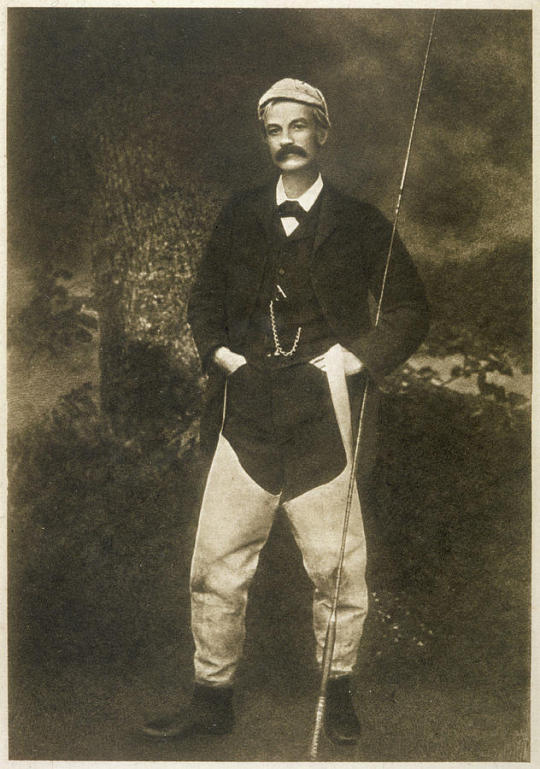
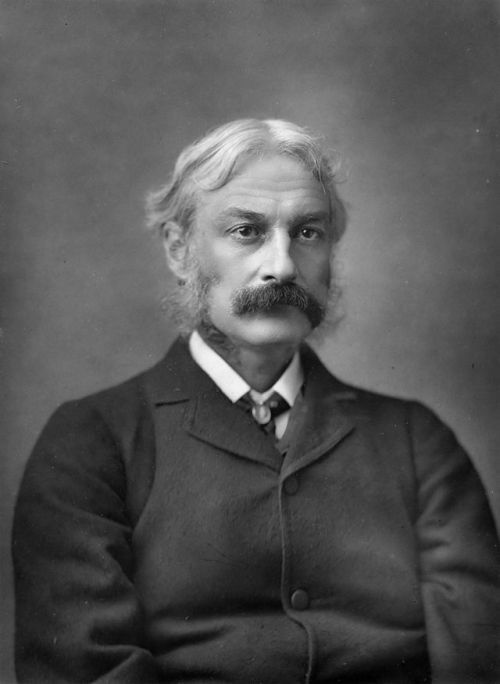
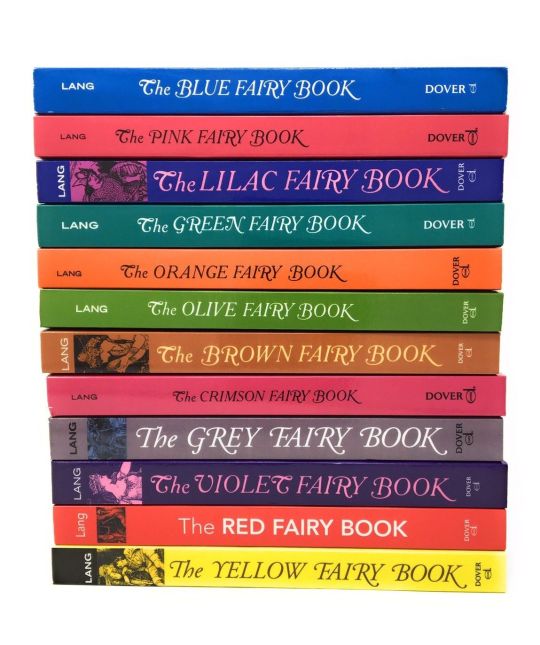
July 20th 1912 saw the death of the prolific poet Andrew Lang.
Andrew Lang was born in Selkirk in 1844, and educated at the universities of St Andrews and Oxford. He studied the classics, writing versions of the Odyssey and the Iliad. He lived and worked in London for most of his life, as a journalist - he was for many years the literary editor of Longman’s Magazine - and as a respected literary critic.
Laing was a folklorist, a scholar of myths and religion, and contributed to the study of anthropology. Perhaps best known today for his collections of fairy stories, his first publication was in verse: Ballads and Lyrics of Old France. It was followed by half a dozen other collections of rhymes and ballads.
His poems may have gone out of fashion but he was probably one of the most well known writers in Victorian times, by the time of his death 106 years ago, Andrew Lang’s name could be found on 249 individual books and his collected journalism ran into thousands of articles. The playwright George Bernard Shaw, a man who never suffered fools gladly, said: “The day is empty unless an article by Lang appears.”
Lang’s grandfather had been the sheriff clerk to Sir Walter Scott – and Lang would later write introductions to every one of the Waverley Novels
As you would expect with a writer of his stature Lang had a very vivid imagination, even at an early age, when studying at Edinburgh Academy he was tasked to write a historical essay about why Elizabeth I never married, he wrote instead a romance, where Elizabeth secretly comes to Scotland disguised as a man to spy on Mary, Queen of Scots. She impersonates Mary’s second husband, Lord Darnley, and is killed in his place; forcing Darnley (who had been off gallivanting) to impersonate Elizabeth and become Queen of England and Mary’s mortal enemy.
Although he sometimes wrote in the Scot’s vernicular, as you’ll see in the poem I have chosen, Lang, who studied at St Andrews and then Oxford, spoke in a very straight anglicised manner. His first meeting with another literary giant, Robert Louis Stevenson did not go well, Stevenson, with his unapologetic Scot’s accent wrote a poem of the encounter
“My name is Andrew Lang/Andrew Lang/That’s my name/And criticism and cricket is my game/With my eyeglass in my eye/Am not I/Am not I/A la-di da-di Oxford kind of Scot/Am I not?”
Regardless of this the two went on to be good pals, even collaborating on some work, which showed the nature of the man, who made friends easily and apart from those mentioned already, counted Sir Arthur Conan Doyle, H. Rider Haggard, Rudyard Kipling, and JM Barrie among his close friends.
As I said earlier the volume of his work was immense, it caused comment from some people to suggested that “Andrew Lang” did not exist, and was a pseudonym used by a cabal of different authors from different genres.
He died of heart disease at the Tor-na-Coille Hotel in Banchory, Banchory, survived by his wife. He was buried in the cathedral precincts at St Andrews, where a monument can be visited in the south-east corner of the 19th century section.
With Lang spending time at St Andrews and his last resting place being in the town, and the fact that The Open is in Scotland this week, it is only natural that I have chosen a poem by Lang about golf.
As you would expect there are loads of his poems online, Poem Hunter, on the link here, has 109. He died of angina pectoris at the Tor-na-Coille Hotel in Banchory, Banchory, survived by his wife. He was buried in the cathedral precincts at St Andrews, where a monument can be visited in the south-east corner of the 19th century section. He may have talked in a more English accent but the titles of some of these poems shows just where his heart lay, Rob Roy, The Battle Of Harlaw, The Bonnie Earl of Moray and Culloden are among the poets work, as well as this, Ballade of the Royal Game of Golf (East Fifeshire)
There are laddies will drive ye a ba’
To the burn frae the farthermost tee,
But ye mauna think driving is a’,
Ye may heel her, and send her ajee,
Ye may land in the sand or the sea;
And ye’re dune, sir, ye’re no worth a preen,
Tak’ the word that an auld man’ll gie,
Tak’ aye tent to be up on the green!
The auld folk are crouse, and they craw
That their putting is pawky and slee;
In a bunker they’re nae gude ava’,
But to girn, and to gar the sand flee.
And a lassie can putt–ony she, -
Be she Maggy, or Bessie, or Jean,
But a cleek-shot’s the billy for me,
Tak’ aye tent to be up on the green!
I hae play’d in the frost and the thaw,
I hae play’d since the year thirty-three,
I hae play’d in the rain and the snaw,
And I trust I may play till I dee;
And I tell ye the truth and nae lee,
For I speak o’ the thing I hae seen -
Tom Morris, I ken, will agree -
Tak’ aye tent to be up on the green!
ENVOY.
Prince, faith you’re improving a wee,
And, Lord, man, they tell me you’re keen;
Tak’ the best o’ advice that can be,
Tak’ aye tent to be up on the green!
https://www.poemhunter.com/andrew-lang/poems/
11 notes
·
View notes
Text
While they exchanged pleasantries, she heard an ahem over her right shoulder. Turning she found herself applied to by Mr Koenig, accompanied at some distance by a man who drew the eye of almost every woman in the vicinity.
“Miss Simmons,” Mr Koenig began. “Mr Fitz asked me to enquire if you might permit an introduction.”
Jemma glanced around at the wide eyes of their audience, barely able to school her own features. Not sure she could trust her voice, she merely curtsied her acquiescence.
Fitz stepped forward.
“Miss Simmons, allow me to present Mr Leopold Fitz of Manderston,” Mr Koenig said solemnly.
Mr Fitz bowed deep and long enough to further raise the brows of the assembled onlookers and Jemma curtsied in such a way that she hoped would convey her sense of the honour bestowed.
Once again upright, Mr Fitz gestured towards the gardens surrounding the church and Jemma was too surprised to do anything other than obediently fall in step with him.
“Well, Miss Simmons,” he began, after they had moved out of earshot of the watching congregation. “Now that we are properly acquainted, allow me to thank you for coming so quickly to Mrs Hunter’s aid during the week.”
Jemma found her amusement quickly overcame her nerves. “Is it a common occurrence that you find your entreaties for assistance denied, Mr Fitz?”
Fitz seemed uncertain as to how to proceed so remained silent a moment longer than Jemma found comfortable. When he spoke again, his voice sounded a little unsteady.
“No, I suppose it is not common that I am denied very much at all,” he allowed, and with a quick sideward glance, she caught an expression that might have been the beginning of playfulness.
Encouraged, she continued, her teasing tone unabated. “And with such liberal license granted, if it were entirely in your power, how would you choose to spend your days?”
Another surreptitious sideward glance saw his countenance grow wistful. “I would sequester myself in my library, order a constant supply of sandwiches and tea and do nothing but read through the pile of novels I have long desired the leisure to give my full attention.”
“You are a great reader then?” Jemma asked.
“I would be,” Fitz replied with a degree of passion, if only I were left to my own devices for more than half an hour at a time.”
“And what are these novels that call to you with their siren song?” Jemma enquired. “Allow me to guess. Does the work of Sir Walter Scott feature prominently in your library? I can imagine this pile of books without even needing to see it. Rob Roy , Ivanhoe and The Lady of the Lake all await you – am I correct?”
“You are, Miss Simmons. And now allow me to ask if your familiarity with these titles comes from your having read them ahead of me, in which case I admit to a deep sense of envy,” Mr Fitz replied.
Jemma laughed heartily. “Novels, sir?” she replied. “Do you not recall the lack of leisure you were earlier bemoaning?”
“Ah,” Fitz replied. “I suppose your… profession prevents you from finding much in the way of time to read.”
“No,” Jemma shook her head. “I assure you, sir, I most certainly do find the time to read and if I find it not, I make it.”
“I see,” Mr Fitz replied, nodding in amused understanding. “Labouring under the delusion that gentlemen should read better books, you have weighed my character and found me wanting. You read to improve your mind, to better equip yourself for your daily dance with life.” He bowed his head in her direction. “However, in my pursuit of novels, you believe I waste my time on mere trifles.”
“I said nothing of the sort,” Jemma replied, only very mildly affronted by his astuteness.
“You didn’t need to, Miss Simmons,” Fitz replied. “Your tone more than adequately conveyed your feelings on the matter. You believe that only medical books and the Bible are fit for edifying consumption and everything else is rubbish.”
“I deserve neither such praise nor such censure!” cried she, while secretly acknowledging herself quite deserving of both.
“I believe we best change the subject before we reveal the depths of our disagreement,” said Fitz. “In truth I think I prefer not to know the extent to which my admission has caused me to fall in your estimation.”
The Master and the Midwife Chapter Two - Read it here!
#fitzsimmons#fitzsimmons fic#fsfic#fstag#the master and the midwife#everyl1ttleth1ng engages in shameless self-promotion#blue blue blue suede queue
3 notes
·
View notes
Text
American Jewish History and...Ivanhoe?
What does Sir Walter Scott’s Ivanhoe, published in 1820, have to do with American Jewish History?-at face value, very little. The book is set in 12th century England, and single-handedly boosted popular interest in such figures as Richard the Lionheart and King John. One of the standout characters from this book is the “Jewess,” Rebecca of York. Rebecca was so popular that, generations before fan communities coined the term “fanfiction,” William Thackeray wrote a post-Ivanhoe fanfic in which the eponymous character ended up with Rebecca instead of Rowena (today, this is called “fix-it fic”).
In the book, Rebecca of York was an accomplished healer. Passionately dedicated to her faith, she chose Judaism over her own life even when threatened with execution by fire, and chose her faith over the love she held for a non-Jewish man. In the end, she left England with her father, Isaac, to settle in Granada.
A fascinating character, Rebecca of York also served a rhetorical purpose. Scott wrote as the “Hep! Hep!” riots broke out in Germany, and as European national identity conflicted with the meaning and implications of Jewish identity in Europe.1 Indeed, this critique was most evident when Rebecca says to Rowena that “less cruel are the cruelties of the Moors unto the race of Jacob than the cruelties of the Nazarenes of England.”
Rebecca of York did not burst out of Scott’s head fully formed. One tradition holds that Rebecca of York was inspired by Rebecca Gratz (1781-1869) of Philadelphia.

1831 Portrait of Rebecca Gratz by Thomas Sully, courtesy of the Rosenbach Museum and Library. Accession no. 2010.0027.1.
A passionate philanthropist and educator, Rebecca Gratz was the most prominent Jewish woman in the Early Republic period of American history. Highly educated, she founded the Female Association for the Relief of Women and Children in Reduced Circumstances in 1801, at the age of 20. She also founded the Philadelphia Orphan Asylum and the Female Hebrew Benevolent Society—the first American Jewish institution run by women. She founded the first “Hebrew Sunday School” in 1838, and served as its president, superintendent, and assisted in developing its curriculum.
Rebecca Gratz maintained friendships with many prominent intellectuals of her day. She was particularly close to Washington Irving. In their youth, Rebecca had nursed Irving’s dying fiancé, Matilda Hoffman, through the last six months of her life, and the Gratz family set aside a room in their home specifically for Irving. Further, In Recollections of my aunt, Rebecca Gratz by Rebecca’s niece, Sara Ann Mordecai, Mordecai recalled that she would “never forget when Washington Irving returned from Spain, after an absence of fifteen years from his native country. I most fortunately was at Aunt Becky’s when he called, immediately after his arrival, to see his old friend, Rebecca, and, with the familiarity of an old friend, she called him ‘Washington.’”
Irving was a frequent traveler, and during one trip, he befriended Sir Walter Scott. During a visit in 1817, Irving told Sir Walter Scott all about his dear friend Rebecca. Three years later, Sir Walter Scott published Ivanhoe. Word began to spread through American society that Rebecca Gratz was the true Rebecca of York. After all, the two women had much in common: their intelligence, their kindness, their beauty, their nursing skills, and their doomed love for non-Jewish men.2 So influential was this rumor that Mordecai opened her Recollections with: “Those who knew my aunt…have gone…to their rest, and I feel that my time is drawing near, and that no one will be left to record the memory of Rebecca Gratz…the original of Scott’s Rebecca in ‘Ivanhoe.’”
So, was Rebecca Gratz the true model for Rebecca of York? Many secondary accounts claim to have seen letters between Irving and Scott stating as much, yet, none have seen these letters since. So, perhaps it is best to allow Ms. Gratz to speak. During her lifetime, many approached Rebecca to ask if the rumors were true. Her response? “They say so, my dear.”
The American Jewish Historical Society has in its collections the Gratz Family Papers, and Recollections of My Aunt, Rebecca Gratz. The American Jewish Archives also has a collection of her papers. That finding aid may be found at http://collections.americanjewisharchives.org/ms/ms0236/ms0236.html.
References:
Jacobs, Joseph. "THE ORIGINAL OF SCOTT'S REBECCA." Publications of the American Jewish Historical Society, no. 22 (1914): 53-60. http://www.jstor.org/stable/43057926.
Mordecai, Sara Ann. Recollections of My Aunt, Rebecca Gratz, 1893. digital.cjh.org/4066398.
Ragussis, Michael. "Writing Nationalist History: England, the Conversion of the Jews, and Ivanhoe." ELH 60, no. 1 (1993): 181-215. http://www.jstor.org/stable/2873312.
Finding Aid; Gratz family (Philadelphia) Papers; P-8; box number; American Jewish Historical Society, New York, NY. http://findingaids.cjh.org/?pID=364725.
Finding Aid, MS-236. Rebecca Gratz Collection. American Jewish Archives, Cincinnati, Ohio. http://collections.americanjewisharchives.org/ms/ms0236/ms0236.html.
1 The Hep! Hep! riots were a series of anti-Semitic riots, which broke out in the German states in 1819.
2 Samuel Ewing, a Christian man, proposed to Gratz. By many accounts, she loved him but refused to marry him due to her faith. (Joseph Jacobs, “THE ORIGINAL OF SCOTT'S REBECCA,” Publications of the American Jewish Historical Society 22 (1917): 53-60; http://www.jstor.org/stable/43057926.
140 notes
·
View notes